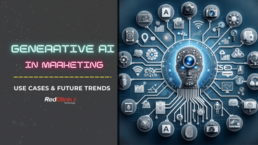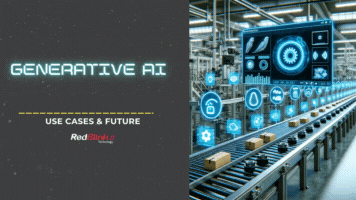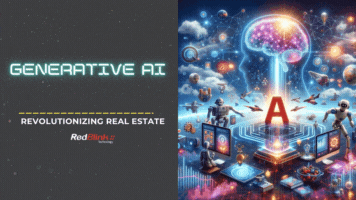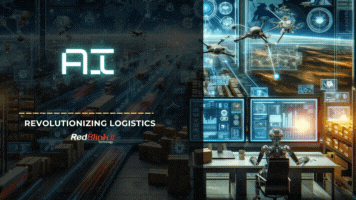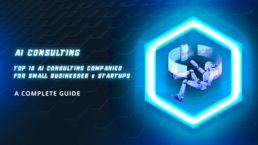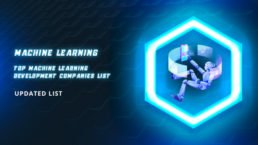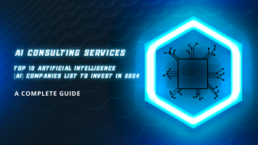Marketers' Guide to Generative AI with Use-Cases for Success
Are you also one of those individuals who thought that AI generated content is not worth it because Google doesn’t rank such content? If yes, you are wrong my friend.
According to the Google Search Central, Google doesn't have any issue with the AI generated content until it follows its E-A-T guidelines and isn't employed solely for fabricating content to manipulate search rankings, which violates our spam policies.
In today's dynamic digital marketing landscape, various branches of artificial intelligence are reshaping corporate and online environments. Among these, Generative Artificial Intelligence (AI) emerges as a potent tool revolutionizing content creation. By leveraging sophisticated algorithms, Generative AI enables marketers to produce high-quality content efficiently, freeing up time for more critical tasks. Moreover, it facilitates a deeper understanding of audience preferences through comprehensive data analysis.
Wondering what exactly the Generative AI is?
Without any further ado, let’s explore…
Understanding Generative AI
Essentially, it's a type of Artificial Intelligence that can
- Create Highly Personalized And Engaging Content,
- Automate Routine Tasks, and
- Derive Actionable Insights From Vast Datasets.
All by learning from existing data. This means it can make stuff that seems like it was made by humans, but it's actually generated by a computer program.
But, it's also important to make sure the content it creates is fair and doesn't spread fake news. By using Generative AI responsibly, marketers can come up with cool new ideas and do well in the digital world.
The Core Technologies Behind Generative AI
To grasp the inner workings of Generative AI in digital marketing, it's essential to explore its mechanisms and capabilities. At its core, Generative AI relies on several pivotal technologies:
- Machine Learning: Serving as the core engine of Generative AI in digital marketing, machine learning algorithms employ techniques such as supervised, unsupervised, and reinforcement learning to process vast datasets and extract patterns and trends. Through optimization algorithms like gradient descent, the AI comprehends audience preferences, facilitating the replication of successful content creation strategies effectively.
- Natural Language Processing (NLP): In digital marketing, NLP algorithms such as recurrent neural networks (RNNs) and transformers play a pivotal role in semantic analysis, syntactic parsing, and sentiment analysis. By tokenizing, embedding, and decoding textual data, NLP enables the AI to generate coherent and engaging content that resonates with audiences, thus enhancing brand messaging and engagement.
- Neural Networks: This is the next technology that serves as the foundational architecture of Generative AI in digital marketing, neural networks consist of interconnected layers of artificial neurons. Utilizing activation functions, backpropagation algorithms, and weight optimization techniques, neural networks learn from data to capture complex patterns and relationships. By leveraging convolutional neural networks (CNNs) for image processing and recurrent neural networks (RNNs) for sequential data, Generative AI analyzes consumer behavior and preferences, empowering marketers to tailor their strategies for maximum impact.
By integrating these core technologies, Generative AI empowers digital marketers to produce a diverse array of content that attracts potential audiences.
Comprehensive Guide to Generative AI Applications in Marketing
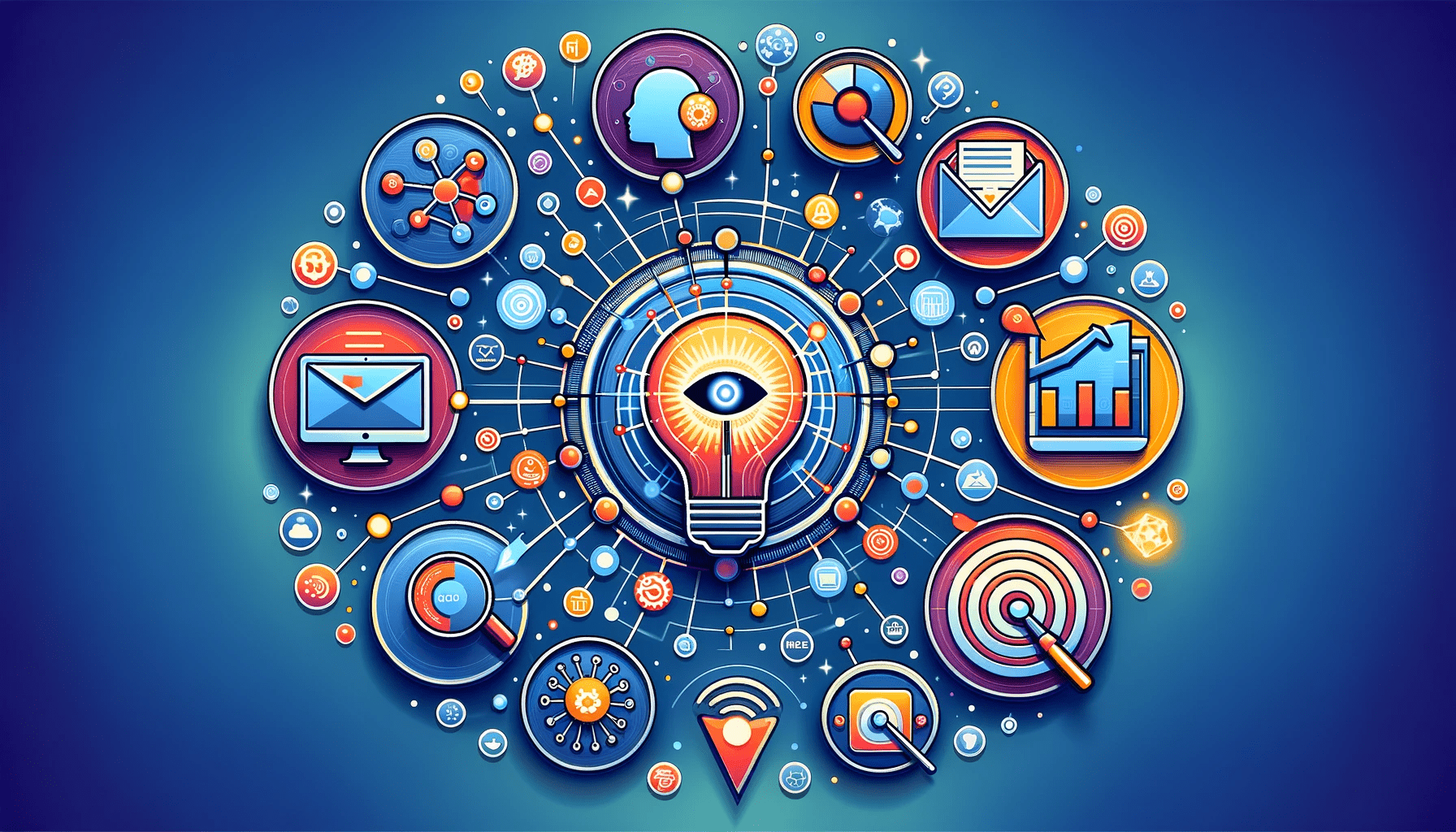
Generative AI is revolutionizing marketing strategies across various fronts by empowering marketers with innovative tools and capabilities. Here's how it's making waves:
- Innovative Content Creation: Generative AI enhances creativity and efficiency in creating textual, image, and video content. It empowers marketers to produce diverse and engaging materials that resonate with their target audiences, allowing them to stay ahead in today's competitive landscape.
- Data-Driven Insights Extraction: Moving further, marketers leverage Generative AI for:
- Market Research
- Consumer Behavior Analysis, And
- Competitive Analysis
By analyzing vast datasets, Generative AI helps uncover valuable insights that inform strategic decision-making, providing marketers with a deeper understanding of their audience and market trends.
- Information Summarization for Strategic Clarity: Generative AI streamlines the process of summarizing reports, presentations, and strategic documents. It condenses large amounts of information into concise and actionable summaries, facilitating better decision-making and enabling marketers to focus on key insights.
- Message Refinement for Impactful Communication: Generative AI also aids in tailoring marketing messages to resonate with diverse audiences. By analyzing consumer preferences and behavior, it helps marketers refine their messaging for maximum impact and engagement, ensuring that their communications are relevant and compelling.
- Advanced Data Classification: Moreover, this amazing subset of AI enables marketers to segment audiences for targeted marketing campaigns. By categorizing consumers based on their interests, demographics, and behaviors, it allows for more personalized and effective marketing strategies, helping marketers reach the right audience with the right message at the right time.
- Automated Question Answering: Generative AI is also used to enhance customer service and engagement through conversational AI. By automating responses to common queries, it improves response times and enhances the overall customer experience, ensuring that customers receive timely and accurate assistance whenever they need it.
In essence, Generative AI empowers marketers with innovative tools and capabilities to drive success in the ever-evolving digital landscape. From content creation to audience segmentation and customer engagement, its applications are vast and transformative, revolutionizing the way marketers connect with their audiences and achieve their business objectives.
Exploring Real-World Use Cases of Generative AI in Marketing
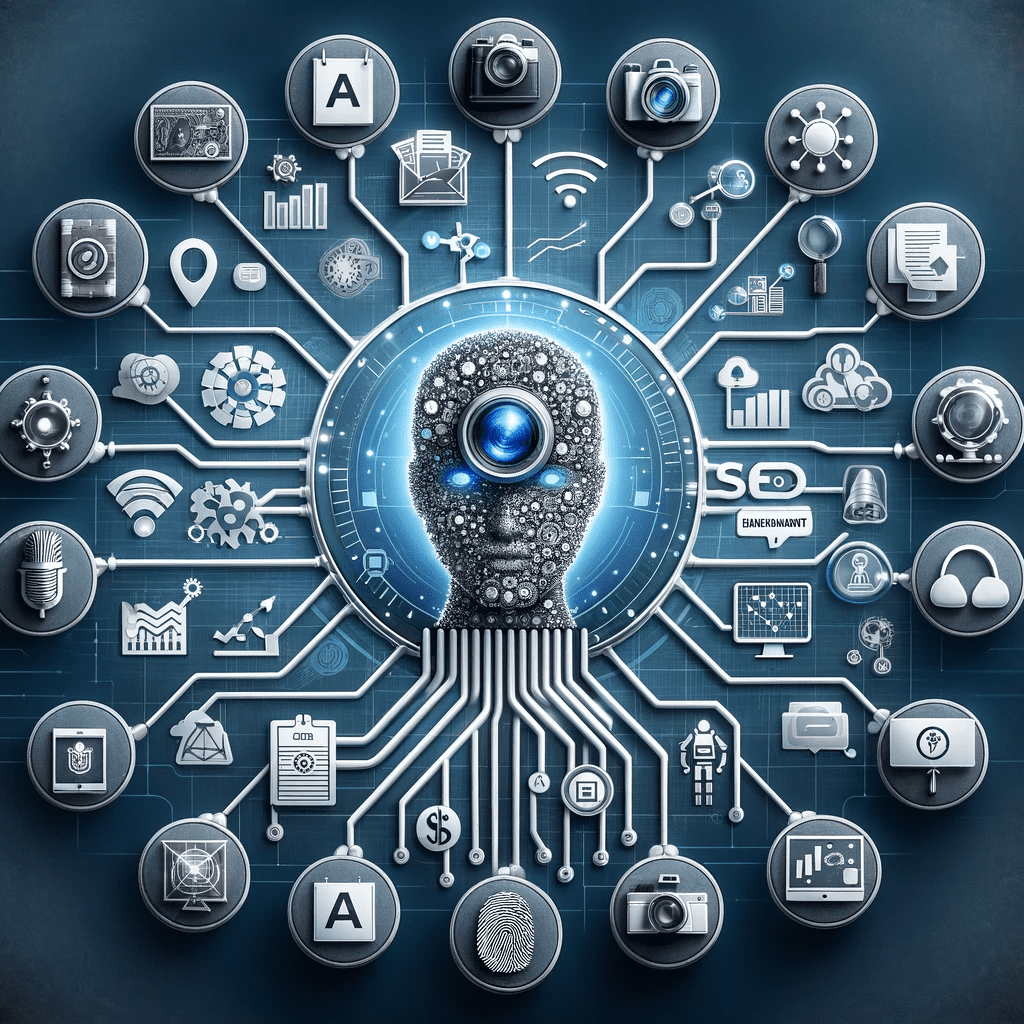
Generative AI isn't just a theoretical concept; it's actively shaping the landscape of marketing through real-world applications. Here are some compelling examples:
Content Generation: This technology revolutionizes content creation across various platforms. From AI-driven blog posts engaging readers with relevant insights to social media and advertising copy resonating with target audiences, Generative AI empowers marketers to produce high-quality content efficiently.
According to the CMO Survey of Fall 2023, a significant 64.7% of Chief Marketing Officers expressed their intention to leverage generative AI for crafting blog posts, while a substantial 62.2% indicated plans to apply it in developing various forms of website content.
Visual and Video Production: When it comes to visual and video content, Generative AI also stands out here. Crafting captivating visuals for social media or engaging video content for marketing campaigns, this technology streamlines the creative process, delivering compelling visual experiences.
SEO Enhancement: Generative AI proves valuable in enhancing SEO efforts. By analyzing data and identifying keywords, it optimizes content for search engines, improving relevancy and user engagement, ultimately driving more traffic.
Market Segmentation and Personalization: Leveraging Generative AI, marketers better understand their audience, delivering personalized messages and campaigns. By segmenting audiences based on interests, demographics, and behaviors, this technology tailors strategies to individual preferences, boosting engagement and conversion rates.
Customer Support: Generative AI transforms customer support through AI chatbots. Providing 24/7 assistance, chatbots answer queries, resolve issues, and offer personalized recommendations, enhancing the customer experience and satisfaction.
Navigating Cookieless Marketing: With the demise of third-party cookies, Generative AI helps navigate audience targeting and ad personalization challenges. By analyzing data and identifying patterns, it develops strategies compliant with privacy regulations, delivering relevant advertising experiences.
Essential Generative AI Tools for Marketers
In the dynamic world of marketing, having the right tools can make all the difference. Here are some essential Generative AI tools that empower marketers to create engaging content across various formats:
1. Text Generation Tools
- ChatGPT Plus: This tool leverages advanced natural language processing (NLP) techniques to generate human-like text for various marketing purposes, from blog posts to social media captions.
- Jasper AI: Jasper AI is another powerful tool for text generation, capable of creating engaging content tailored to specific audiences and marketing objectives.
- Wordtune: Wordtune helps marketers refine their written content by offering suggestions for improvements in tone, clarity, and style, enhancing the overall quality and impact of their messaging.
2. Image Creation and Editing
- DALL-E 2: Developed by OpenAI, DALL-E 2 is a state-of-the-art image generation model capable of creating unique and realistic images based on textual descriptions, providing marketers with endless possibilities for visual content creation.
- Midjourney: Midjourney is a versatile image editing tool that utilizes Generative AI to enhance and manipulate images, allowing marketers to customize visuals for their campaigns with ease.
- Adobe Firefly: Adobe Firefly is an innovative tool that combines Generative AI with Adobe's powerful editing capabilities, enabling marketers to create stunning visual content for their marketing initiatives.
3. Video Production and Animation
- Runway: Runway is a cutting-edge platform that empowers marketers to create dynamic videos and animations using Generative AI techniques. From product demos to explainer videos, Runway offers a range of tools to bring marketing concepts to life.
- Synthesia: Synthesia specializes in AI-driven video production, allowing marketers to generate personalized video content at scale. With its intuitive interface and powerful features, Synthesia makes it easy to create engaging videos for various marketing channels.
These essential Generative AI tools provide marketers with the capabilities to enhance their content creation processes, streamline workflows, and deliver impactful marketing campaigns across different mediums. As technology continues to advance, the possibilities for leveraging Generative AI in marketing will only continue to grow.
Unlocking the Power of Generative AI with RedBlink Technologies
At RedBlink Technologies, we're spearheading the revolution in generative AI, empowering businesses in the digital era. Generative AI isn't just a vision of the future—it's a transformative force for marketers. Leveraging machine learning, NLP, and neural networks, our solutions craft compelling content and extract valuable insights.
From content creation to automated analysis, our suite of tools such as ChatGPT Plus and DALL-E 2 elevate marketing strategies. Join us at RedBlink and shape the future of marketing with generative AI. Book a consultation today to explore the possibilities!
Generative AI in Manufacturing Industry - Use Cases & Future
Are you tired of the same old production methods that limit your creativity and flexibility? Do you feel like you're missing out on the growing demand for personalized and unique products? Then, look no further than Generative Artificial Intelligence (Gen AI), the latest game-changing technology to hit the manufacturing industry.
With Generative AI, manufacturers can say goodbye to cookie-cutter products and hello to endless possibilities. It's no wonder that companies across the manufacturing industry are jumping on board this innovative technology. After all, it's also about efficiency and cost savings.
Using real-time data, Generative AI can optimize the production process to reduce waste and improve productivity. This means faster production times, lower costs, and higher-quality products. So if you're looking to take your manufacturing business to the next level, don't let traditional production methods hold you back.
This blog will give you a detailed guide on how generative AI can transform your manufacturing industry and what technologies you can adopt for further advancements. Let’s take a look!
Generative AI's Role in Manufacturing
The role of generative AI in the manufacturing industry is significant and far-reaching. Generative AI can automate the design process, analyze data to identify patterns and anomalies and reduce the time and cost involved in product development. This technology can give manufacturers a competitive edge in the market and help them to stay ahead of the competition.
Key Facts
Here's a couple of interesting facts -
- Reports have shown that the global AI manufacturing market is expected to reach $9,890,000,000 USD by 2027.
- According to the Manufacturing Leadership Council's recent survey, Manufacturing in 2030 Survey: A Lens on the Future, 84% of respondents expect digital transformation to accelerate. Hence, we have more data and more opportunities to monetize it.
- Research suggests that European manufacturers are already embracing the AI surge, with 69% of German manufacturers saying they are ready to implement some form of AI in their operations soon.
- According to MarketResearch.Biz, the Generative AI in Manufacturing Market size is projected to surpass around USD 6,398.8 Million by 2032, and it is poised to reach a registered CAGR of 41.06% from 2023 to 2032. In 2022, the global generative AI in Manufacturing Market was worth USD 223.4 Million.
- The European Commission estimated that as much as 50% of production in some industries can be dispensed with altogether because of defects.
Here are some key points on the role of generative AI in the manufacturing industry:
- Generative AI can optimize product design by creating designs that are more efficient, sustainable, and cost-effective.
- Generative AI automates the design process, allowing human designers to create more options in a fraction of the time.
- Generative AI can help manufacturers to improve production processes by analyzing data from sensors and other sources to identify patterns and anomalies that can be used to optimize manufacturing processes.
- This can help manufacturers to reduce waste, increase efficiency, and improve the overall quality of their products.
- Generative AI can reduce the time and cost involved in product development by automating the design process and optimizing manufacturing processes.
- This can give manufacturers a competitive edge in the market and help them to stay ahead of the competition.
- Generative AI can be used to create better quality products that meet the demands of customers by analyzing customer data and feedback to identify trends and preferences.
- This can help manufacturers to build stronger relationships with their customers and increase customer loyalty.
Generative AI Use Cases for Manufacturing Industry
Generative AI, with its ability to create new and unique content, has found several compelling use cases within the manufacturing industry. Here are a few notable applications:
1. Quality Assurance
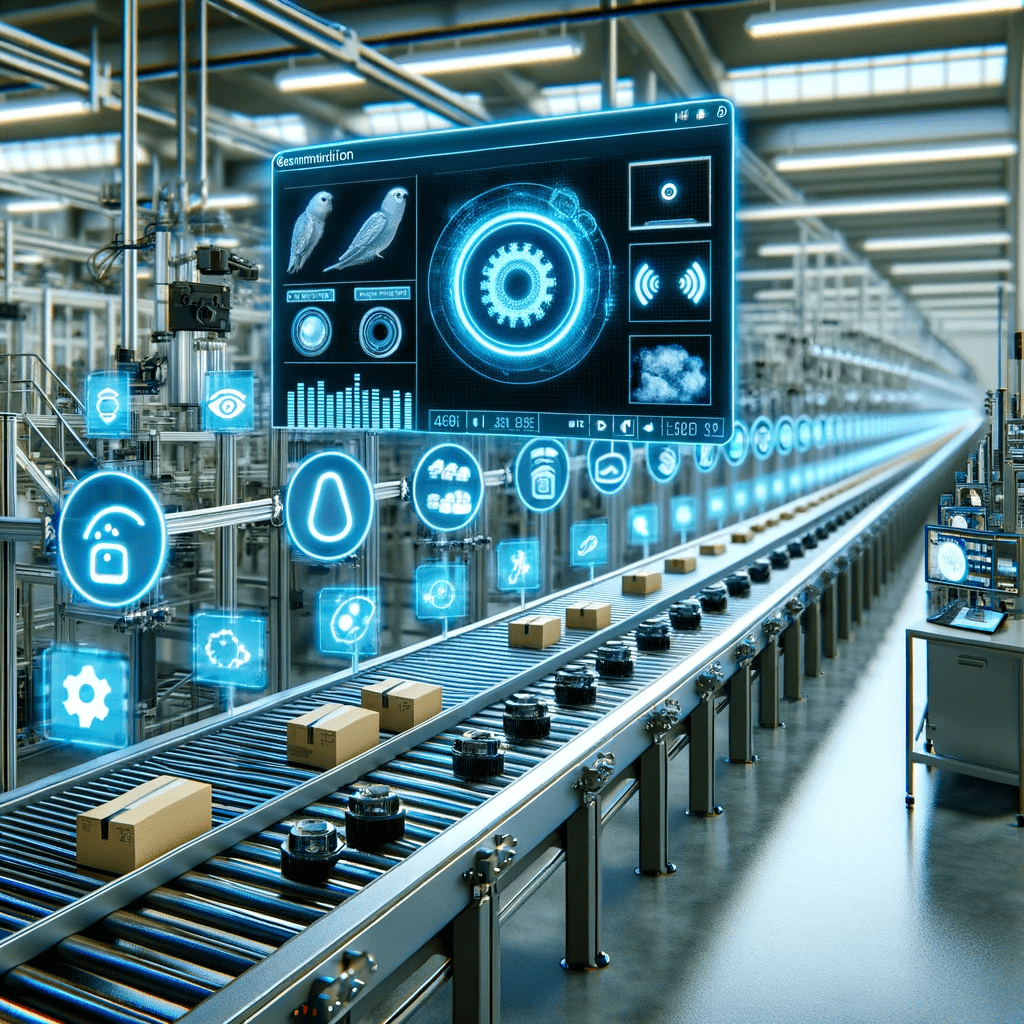
Many organizations are currently facing challenges with quality assurance.
The issue is that the costs associated with ensuring quality are significantly impacting their sales revenue. In some cases, these costs can eat up as much as 20% to 40% of the total revenue, which is a substantial amount.
Considering these staggering figures, it becomes apparent that improving quality assurance can have a significant positive impact on profits. To better understand this, let's take the example of fast-moving consumer goods companies (FMCG). These companies have long struggled with poorly printed labels that cause disruptions in their production lines when applied to wet labels.
To address this problem, solutions like APRIL Eye have come to the rescue. Such solutions perform image classification and object detection. At incredible speeds of over 1000 packs per minute, it verifies date and label codes, overcoming challenges such as font distortion, missing text, and varying fonts. Hence, the production lines are no longer come to a halt due to label issues.
2. Detect Inspection
Quality control has always been a challenge in manufacturing, as human error can affect the accuracy of traditional assembly lines. However, with the advancements in AI, specifically computer vision, manufacturers now have a powerful tool to improve their inspection processes.
Computer vision uses automated optical inspection (AOI) to detect and identify defects in products. Using multiple cameras, it can easily identify missing pieces, dents, cracks, scratches, and other damages. As a result of the cameras capturing millions of data points, providing detailed information about the product's condition.
Companies have already started adopting AI visual inspection in their manufacturing processes. For example, in smartphone manufacturing, companies like FIH Mobile are using computer vision to highlight defects and improve assembly lines in the future.
Manufacturers can save time and money through the use of computer vision by reducing errors and waste. The use of AI-based defect inspections ensures fast and accurate assessments of defects using techniques such as template matching, pattern matching, and statistical pattern matching. In addition, AI systems can continuously learn about defects, improving their performance over time.
3. Product Assembly
The shift towards automation is part of the broader trend in the manufacturing industry known as Industry 4.0. Manufacturers are increasingly embracing automated product assembly processes, and one technology playing a vital role in this transformation is AI.
Manufacturers use such technology to improve their product assembly processes in various ways. For instance, by employing computer vision inspection systems and 3D modeling designs, manufacturers can streamline specific tasks that have traditionally been challenging for human workers.
AAI, like Computer vision, also guide through Standard Operating Procedures, particularly when they have to switch between different products frequently. This enables more efficient processes and ensures that workers have clear instructions to follow for each step.
Moreover, this technolgy keep managers informed about any malfunctions or problems that require immediate attention. Installing computer vision-powered cameras send images into an AI algorithm, which scans and flag potential faults. When an issue is detected, the algorithm instantly notifies the manager, allowing prompt action to be taken.
AI plays a role in enhancing the precision of robotic arms used in the product assembly process. Its computer vision technology makes robotic arms more accurate and efficient by guiding and monitoring them.
4. Product Design and Optimization
Product design and development is a critical aspects of the manufacturing industry, and generative AI techniques can be used to optimize this process. Its machine learning algorithms help in generating optimized designs based on specific performance criteria.
So, businesses can create innovative, functional, and aesthetically pleasing products that meet customer needs and preferences. Generative AI can help manufacturers explore a wide range of design possibilities quickly and efficiently, allowing them to create optimized designs that meet specific requirements and constraints.
It can also reduce design time, optimize materials usage, and reduce production costs by automating the design process. Hence, through generative AI Product design and development, manufacturers can create better products that meet customer needs and preferences while also improving efficiency and reducing costs.
5. Predictive Maintenance and Quality Control
Predictive maintenance and quality control are critical components of the manufacturing industry, and generative AI techniques can help streamline and optimize these processes.
The algorithms of generative AI analyze sensor data from production processes and equipment to identify potential issues before they occur. It further enables manufactureres to perform manitenance and repairs proactively, reduces downtime, and minimizes the risk of defects and quality issues.
Such algorithms can also analyze data from visual inspection systems to identify defects and quality issues in real-time, allowing manufacturers to take corrective action quickly and efficiently.
6. Material Science and Synthesis
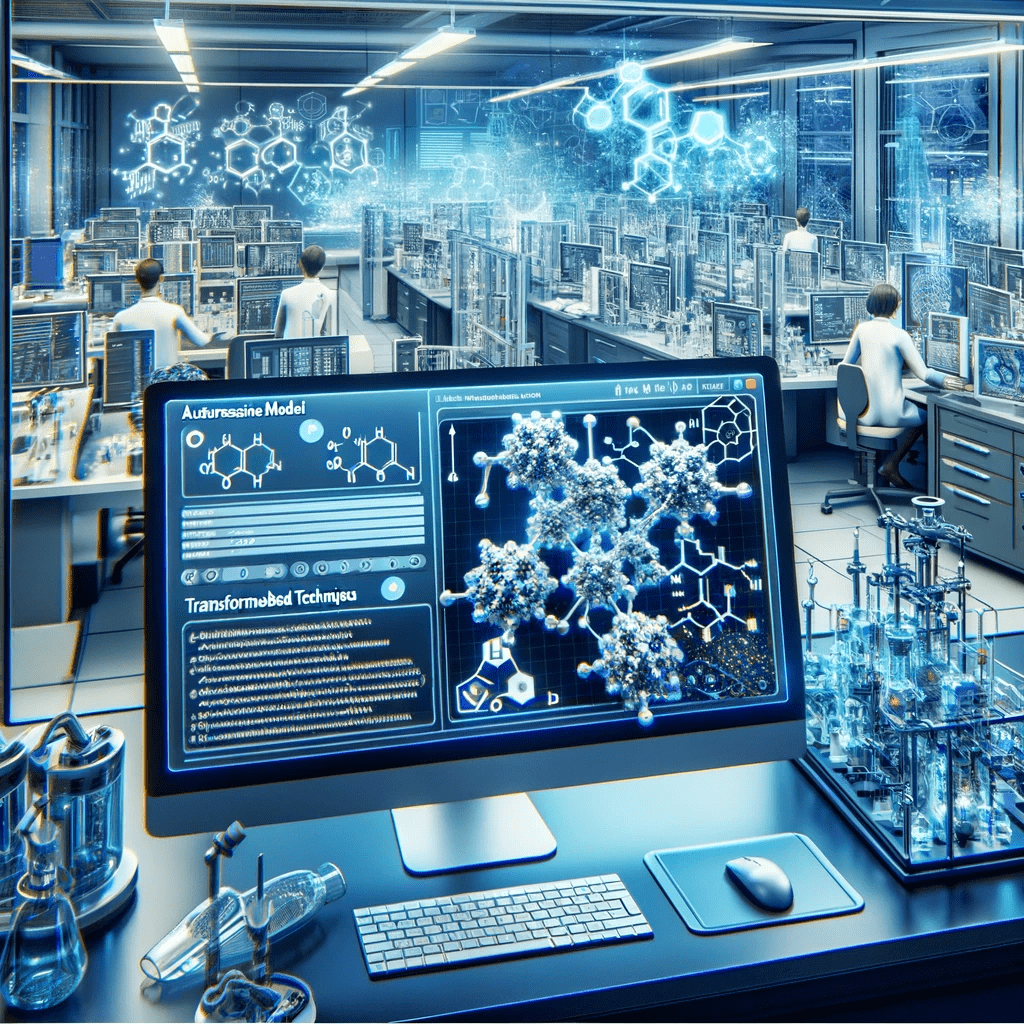
In this, Generative AI techniques like autoregressive models and transformer-based models to predict the properties of new materials and synthesize materials with specific properties, such as strength, durability, and flexibility.
Generative AI algorithms can analyze large datasets and simulate various material combinations to generate optimized materials with desired properties. This can help manufacturers create more efficient and innovative materials that meet specific application needs.
In this way, Generative AI can also reduce the time and cost associated with traditional trial-and-error approaches and enhance the overall productivity of the manufacturing process.
7. Process Planning and Simulation
Generative AI can identify potential issues and optimize production efficiency by generating optimized process plans and simulating manufacturing processes. It also helps manufacturers reduce lead times, increase product quality, and improve overall efficiency by identifying the most effective manufacturing processes.
These techniques can also be used to simulate complex manufacturing environments, which can help identify bottlenecks and optimize production workflows.
With generative AI, manufacturers can simulate and optimize production processes without the need for costly and time-consuming physical trials, thereby reducing costs and improving productivity.
8. Human-Robot Collaboration
Human-robot collaboration is a key area where generative AI can be applied in the manufacturing industry. Robots and humans can collaborate better during production when trajectories are optimized using generative AI.
For example, generative AI can assist human operators in real-time decision making by providing insights on how to optimize robot trajectories and minimize the risk of errors or accidents.
Additionally, generative AI can be used to generate optimized paths for robots, allowing them to operate more efficiently and effectively in collaborative work environments. As a result, human-robot collaboration can be more productive, safer, and more efficient with the help of generative AI in the manufacturing industry.
9. Generative Design
Generative design is a specific use case of generative AI in the manufacturing industry to generate thousands of possible design alternatives based on specified constraints and performance criteria.
Through this process, manufacturers can explore a much larger design space and identify the most efficient, effective, and aesthetically pleasing designs for their products. In addition to reducing costs, generative design is also helpful for improving product quality and increasing production efficiency by streamlining the design process.
It also let's designers focus on higher-level creative tasks rather than repetitive design iterations. This way, manufacturers can create more innovative, optimized, and personalized products that meet the evolving needs and preferences of their customers.
10. Production Planning and Optimization
Production planning and optimization is a critical process in the manufacturing industry that involves managing production schedules, optimizing workflows, and ensuring the timely delivery of products to customers.
Generative AI techniques can be used to analyze historical production data, identify production bottlenecks and inefficiencies, and generate optimized production schedules and workflows that can improve production efficiency, reduce downtime, and minimize the risk of quality issues.
These also use to simulate different production scenarios and optimize production lines, helping manufacturers make better decisions and improve overall performance.
With the help of generative AI, businesses in the manufacturing industry can streamline their production planning and optimization processes, reduce costs, and improve customer satisfaction by delivering high-quality products on time.
11. Quality Control and Inspection
Quality control and inspection are critical aspects of the manufacturing industry that ensure that products meet customer requirements and safety standards. Generative AI techniques is used to improve quality control and inspection by analyzing data from sensors and visual inspection systems to identify defects and quality issues in real time.
Machine learning algorithms are trained to recognize specific patterns and anomalies in the data, allowing manufacturers to quickly identify and address issues before they impact production.
In addition to automating inspection processes, generative AI can also reduce the risk of human error. This way, manufacturers can improve product quality, reduce waste, and enhance customer satisfaction.
12. Supply Chain Management
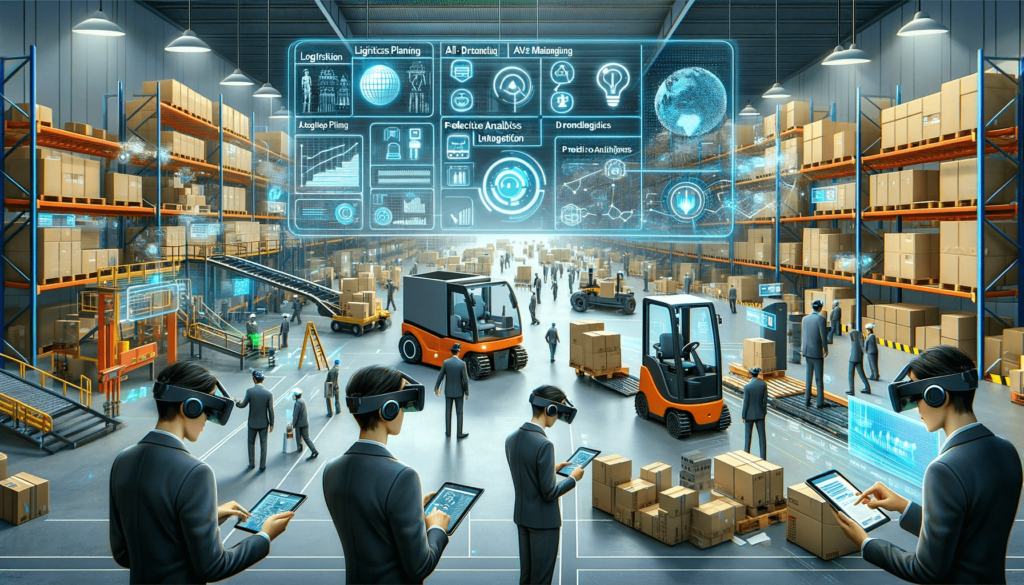
AI in Supply chain management is used to optimize inventory management and distribution strategies. Generate AI can optimize inventory management, production planning, and distribution by analyzing historical data and demand forecasts, allowing manufacturers to reduce lead times, minimize inventory costs, and improve customer service.
This can also help manufacturers improve their supply chain resiliency by identifying potential risks and disruptions and proactively addressing them. In addition, generative AI can be used to optimize logistics and transportation routes, reducing transportation costs and improving delivery times.
List of the Best Generative Design Softwares in 2024
Generative AI tools are becoming increasingly popular in the manufacturing industry due to their ability to improve efficiency, reduce costs, and optimize production processes. Here are the top 10 tools of generative AI in the manufacturing industry:
1. Autodesk Fusion 360
Autodesk Fusion 360 is a powerful CAD/CAM software that is specifically designed for the manufacturing industry. This software uses generative design technology to help engineers and designers create optimized designs based on specific performance criteria and manufacturing constraints.
Fusion 360 also includes simulation tools that allow for virtual testing and prototyping, reducing the need for physical prototypes and saving time and money in the design process.
Additionally, Fusion 360 is a cloud-based software, allowing for easy collaboration and data management across teams and locations. This is an essential tool for the manufacturing industry, helping to streamline the design process, reduce costs, and improve product quality.
2. Siemens NX
Siemens NX is a powerful computer-aided design software that is widely used in the manufacturing industry. Its generative design capabilities allow engineers and designers to optimize product design and improve production efficiency.
With features such as topology optimization, design validation, and simulation, Siemens NX enables users to create and test multiple design alternatives quickly and efficiently. It also supports various manufacturing processes, including CNC machining, additive manufacturing, and mold and die design.
With Siemens NX, manufacturers can improve their design and production processes and bring high-quality products to market faster.
3. IBM Watson Studio
IBM Watson Studio is a cloud-based data science platform that provides a suite of tools and services for developing, training, and deploying machine learning models in the manufacturing industry.
It offers a wide range of capabilities, including data preparation, data visualization, machine learning, and deep learning, allowing manufacturers to generate insights for predictive maintenance, quality control, and production optimization.
With IBM Watson Studio, manufacturers can improve their operational efficiency, reduce costs, and increase overall productivity. Also, IBM Watson Studio is designed to be scalable and flexible, making it an ideal solution for businesses of all sizes.
4. Ansys Discovery
It uses generative design to create and analyze thousands of design alternatives, allowing engineers and designers to quickly identify the optimal design based on specific performance criteria.
With Ansys Discovery, manufacturers can improve product performance, reduce development time, and minimize costs by identifying potential design issues early in the design process.
The software also allows for the simulation of various manufacturing processes, such as casting, injection molding, and additive manufacturing, enabling manufacturers to optimize their production processes and improve quality control.
5. GAMS
GAMS, or General Algebraic Modeling System, is a powerful mathematical modeling and optimization software that is commonly used in the manufacturing industry.
This software is used to solve complex mathematical problems and create optimization models for production planning, scheduling, inventory management, and supply chain management. Furthermore, it is designed to be flexible and customizable, allowing manufacturers to tailor the software to their specific needs and constraints.
With GAMS, manufacturers can optimize their production processes, reduce costs, and improve efficiency, making it an important tool for staying competitive in the fast-paced manufacturing industry.
6. TensorFlow
TensorFlow provides powerful tools to optimize production processes, improve product quality, and reduce costs. In manufacturing, the tool is commonly used for image and speech recognition, predictive maintenance, process optimization, and other applications that require advanced machine learning and deep learning algorithms.
Its flexibility and ease of use make it a popular choice for manufacturers looking to implement generative AI tools in their operations. TensorFlow's ability to run on multiple platforms, including CPUs, GPUs, and mobile devices, further adds to its appeal in the manufacturing industry.
7. Keras
It is well-suited for image and text recognition, which can be used in quality control and inspection processes. Keras allows for easy and efficient prototyping of neural networks, which can be trained on large datasets to recognize patterns and generate insights for production optimization and predictive maintenance.
The software also supports transfer learning, making it a versatile tool for manufacturers looking to leverage AI for various applications. In simple words, Keras is a powerful tool for the manufacturing industry, allowing for efficient development and deployment of deep learning models for generative AI applications.
8. PyTorch
One of the key advantages of PyTorch is its flexibility and ease of use, making it easy for engineers and data scientists to create neural networks for generative AI applications. PyTorch is particularly useful in image and text recognition applications, allowing manufacturers to improve their quality control processes and optimize production processes.
Besides, PyTorch can be used for predictive maintenance, supply chain management, and product design optimization, making it a valuable tool for manufacturers looking to leverage the benefits of generative AI.
9. Apache MXNet
This deep learning framework is gaining popularity in the manufacturing industry due to its ability to support multiple programming languages and optimize both CPU and GPU computing.
MXNet is designed to handle large-scale machine learning projects, making it a powerful tool for manufacturers looking to optimize their production processes, improve product design, and reduce costs. Its ability to scale efficiently and handle large volumes of data make it a popular choice for manufacturing companies looking to leverage the power of deep learning and generative AI techniques.
MXNet's flexible architecture and support for multiple programming languages also make it a popular choice for developers and data scientists working in the manufacturing industry.
10. RapidMiner
RapidMiner can analyze large amounts of data from various sources to identify patterns, predict equipment failure, and optimize production processes. With its user-friendly interface and drag-and-drop feature, it allows even those without extensive data science backgrounds to easily create predictive models and generate insights.
The platform's ability to integrate Generative AI with other tools and systems, such as ERP and MES, makes it a valuable addition to any manufacturer's digital toolkit.
Predictive Maintenance Using Generative AI
The future of Generative AI in the manufacturing industry looks promising as the technology continues to evolve and improve. Some potential directions for the future of Generative AI in the manufacturing industry include:
- Increase Customization: Generative AI can be used to create bespoke products that cater to individual customer needs and preferences. In the future, we can expect to see more customized products being produced using Generative AI.
- Improve Efficiency: Generative AI can optimize production processes, reduce waste, and improve efficiency. In the future, we can expect to see even greater improvements in manufacturing efficiency as Generative AI continues to be used more widely.
- Better Product Design: Generative AI can create unique and innovative designs that are difficult or impossible to generate through traditional design methods. In the future, we can expect to see more products with novel and interesting designs being produced using Generative AI.
- Predictive Maintenance: Generative AI can be used to predict potential issues before they occur, reducing downtime and maintenance costs. In the future, we can expect to see more manufacturers using Generative AI for predictive maintenance tasks.
- Integration With Other Technologies: Generative AI can be used in conjunction with other technologies such as IoT (Internet of Things) and robotics to create smart factories. In the future, we can expect to see more advanced manufacturing processes that incorporate Generative AI alongside other cutting-edge technologies.
Hence, the future of Generative AI in the manufacturing industry looks bright, and we can expect to see continued advancements and innovations as the technology continues to evolve.
Conclusion!
So, by leveraging the power of Generative AI, manufacturers can streamline their operations, reduce costs, and create unique and innovative products that stand out in the market.
At RedBlink, an AI consulting and generative AI development company, we are helping clients build a Generative AI solution and providing cutting-edge explanations that enable manufacturers to harness the power of Generative AI to improve their operations and stay ahead of the competition. We are uniquely positioned to deliver innovative and effective keys that meet the needs of our clients. By hiring our skilled team of ChatGPT developers and machine learning engineers , businesses can unlock the potential of AI and enhance their operations with customized solutions tailored to their specific needs.
Whether you are looking to optimize your production processes, improve product design, or predict maintenance issues before they occur, RedBlink will help you achieve your goals. Contact us today to learn more about how we can help your manufacturing business thrive in the era of Generative AI.
Generative AI in Construction Industry - Creating Future Trends
As a rule, managing a construction project relies on human knowledge and experience.
This works, but…
It has some drawbacks that affect efficiency and consistency.
Today, we face new challenges like a shortage of workers, increased government involvement, and the need to save costs. To tackle these issues, people have started using AI (Artificial Intelligence) to assist in construction projects.
AI technologies can greatly enhance the efficiency of construction projects in terms of time, labor, and cost.
These benefits are not just theoretical; they have practical applications.
In this article, we will explore the most important ways AI is currently being used in construction. Let's take a look!
Generative AI Applications For Construction
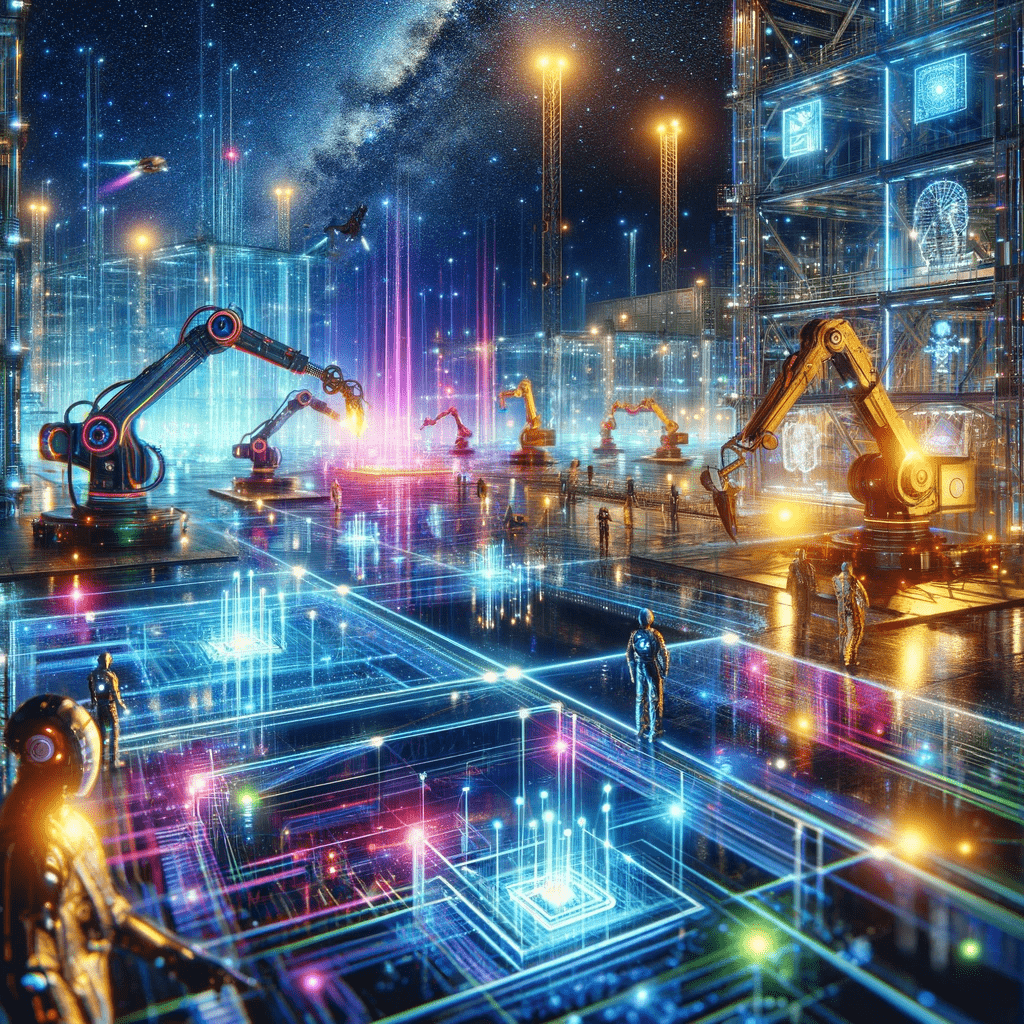
Powerful Generative AI Models can generate detailed 3D models, construction plans, and project specifications with just a few prompts. This automates and accelerates early design phases. Generative AI also enhances collaboration - stakeholders can iterate and provide feedback on generated drafts.
During construction, generative AI assists in optimizing schedules, logistics, and workflows. It can identify risks and inefficiencies. Post-construction, generative AI analyzes data to derive insights and best practices for future projects.
Let’s know all this information in detail in the following section.
1. Personal Protective Equipment (PPE) Detection
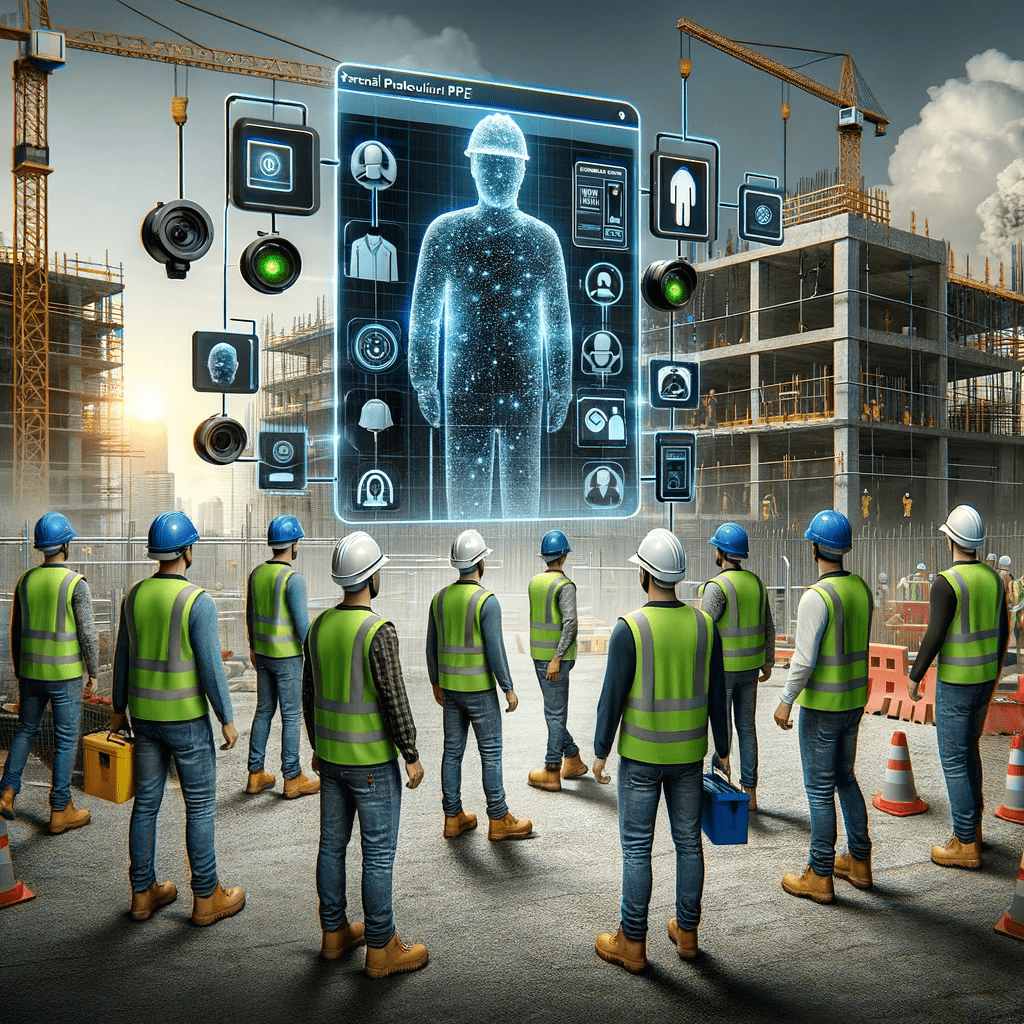
Protective equipment can save lives, but only if people wear it.
According to the National Institute for Occupational Safety and Health (NIOSH), roughly 2,000 workplace injuries happen each day in the U.S. that could be prevented through protective equipment.
Construction managers have limited time and eyesight, so it's hard for them to ensure everyone is wearing the right protective gear.
But technology can help.
Artificial intelligence (AI) can identify different types of protective equipment like hard hats, gloves, and goggles. AI detects objects through deep learning techniques that use lots of images to train a model.
Once trained, AI models can recognize safety gear in images with high accuracy. This means that cameras installed on construction sites can act as extra eyes, assisting construction managers in ensuring the safety of their workers.
A study developed a system that could detect 8 types of protective equipment and 9 postures in real time. Using 95 videos of construction sites, the model was able to identify the gear and body positions.
When tested on new footage, the system correctly identified the protective equipment over 83% of the time and spotted missing gear over 95% of the time. Monitoring protective equipment used on construction sites can be done with AI to improve safety.
2. Detect Corrosion
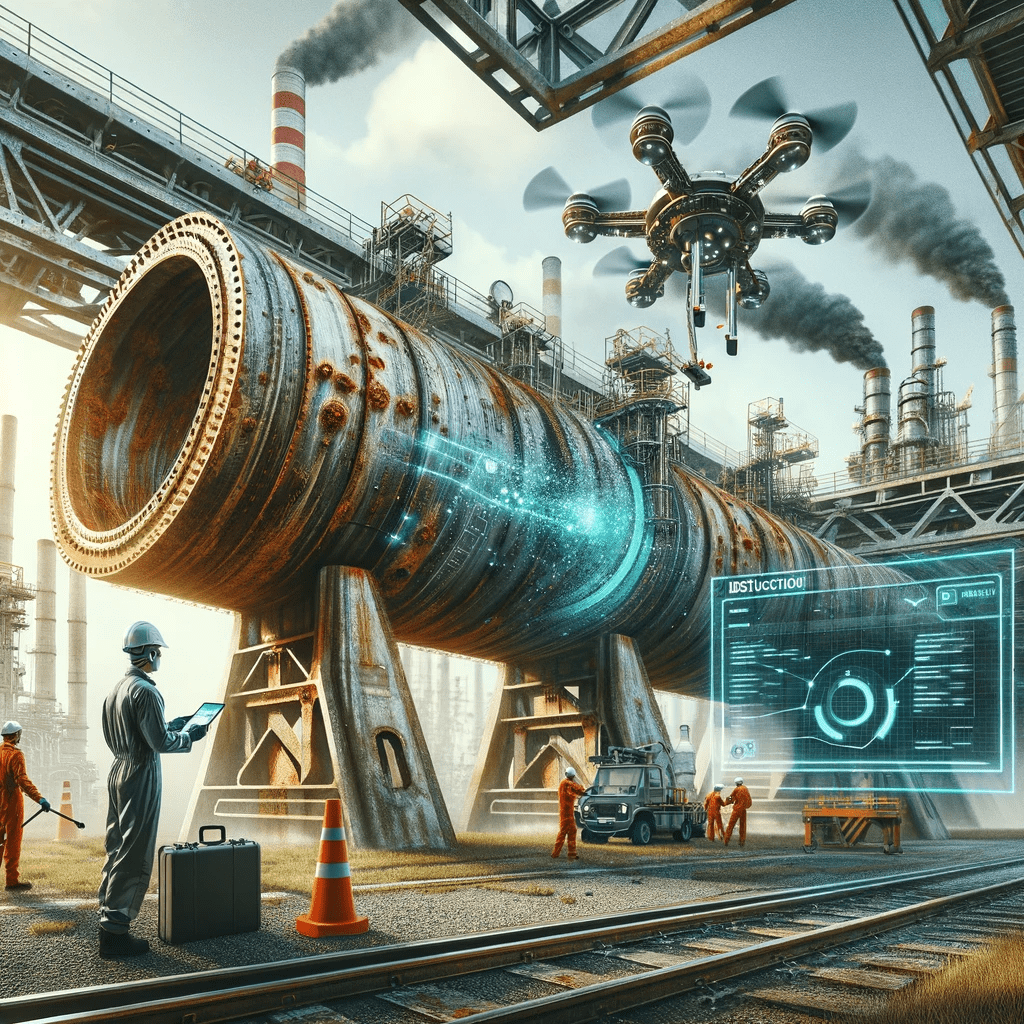
Keeping workers safe through protective equipment and hazard monitoring is one way AI helps construction sites. Because using image classification, AI can also detect corrosion.
Detection of corrosion is necessary. Otherwise, it can pose a significant threat to construction operations and human safety. Corrosion can lead to machinery and structures breaking down, resulting in increased maintenance costs, environmental harm, injuries, and even loss of life.
Currently, certified inspectors check for corrosion, but it's subjective and prone to error. Given the high stakes involved, it would help site managers to have consistent and objective corrosion detection.
For example, Infosys and other companies are developing AI solutions based on neural networks to reliably and consistently detect and classify corrosion.
Can AI detect such small changes?
Yes! The algorithm does two things -
- It identifies types of corrosion and differentiates between coating loss and actual rust in various types of corrosion.
- It determines how severe the corrosion is.
Hence, AI can consistently detect corrosion earlier and more accurately than human inspectors. This helps construction managers fix issues before they cause more serious problems.
3. Detect Workplace Hazard
While monitoring PPE compliance can improve safety, workers still need to watch for hazards themselves.
The Health and Safety Executive in the UK reported 142 worker deaths in 2019/2020 and 693,000 injuries. The cost of construction injuries was £16.2 billion that year. Clearly, keeping construction workers safe is a significant responsibility.
But, AI-based computer vision solutions have been developed to track, predict, and prevent workplace accidents. In simple terms, its object-tracking technique can identify hazards like flammable materials and warn managers and workers in real-time.
A platform called IRIS uses AI to create a virtual map of the work area from CCTV. It notifies workers of hazards via WhatsApp, SMS, alarms or through other messaging apps. Their AI detects forklifts and raises alarms if they're moving unsafely. It can also identify fires earlier than traditional systems.
Computer vision can monitor worker posture and pose, using techniques like human pose estimation, to prevent injuries from improper lifting or manual handling. If workers are at risk of harming themselves, AI models issue warnings.
Everguard uses computer vision, wearables, and sensors to improve safety with PPE detection, fall detection, forklift safety, anti-collision, crane detection, and posture detection.
Some AI, like IntenseEye, prioritizes both safety and privacy. They process visual data, delete it, and blur faces to ensure anonymity. Hence, they don’t store any personal information and focus on safety, not surveillance.
So, there's no need to worry that an intrusive presence is watching over the workplace. The primary focus of these AI technologies is safety.
4. Auditing Infrastructure Assets
Traditionally, humans have been responsible for observing and judging the condition of these assets, like checking for corrosion. However, human assessment can be inconsistent and unreliable, which wastes time and resources.
But, with the help of AI systems like computer vision is helping human inspectors to make more objective assessments. These systems analyze images or video footage of the assets through cameras and advanced algorithms. Thus, they can provide more accurate and reliable information.
One of the advantages of using computer vision for infrastructure inspection is the ability to monitor construction sites remotely. Remote monitoring allows real-time tracking of:
- Infrastructure assets
- Construction progress
- Building information models (BIM)
These AI systems can track progress on a construction project as a whole, as well as identify individual assets, track user information, and track maintenance requirements.
This further help in finding problems like cracks, concrete spalling, leakages, or other type of damages and informing inspectors/managers immediately.
5. Performing Predictive Maintenance
Keeping people safe and healthy on a construction site is extremely important, but it's also crucial for construction managers to take care of the equipment being used.
According to McKinsey, construction managers can increase machine longevity by 20-40% and reduce the amount of time machines are out of service by 30-50% by using a technique called predictive maintenance.
Replacing equipment is costly, so identifying issues early is a better chance of fixing it before it becomes a bigger issue. While humans can inspect and identify problems, they can't do it reliably 24/7. Thankfully, AI and machine learning can.
But, training machine learning systems with a large amount of historical data can start predicting when and what type of maintenance will be needed for a specific set of equipment. Using sensors connected to the Internet of Things (IoT), the AI model can detect defects more accurately and improve its predictions.
Hence, having proper functioning equipment is able to predict when maintenance is required to solve business problems and makes decision-making more efficient.
Yes, it's true that construction managers still need to check this data and make decisions accordingly. However, always remember that data-driven predictions will only help them to do this better.
6. Monitoring Labor Efficiency
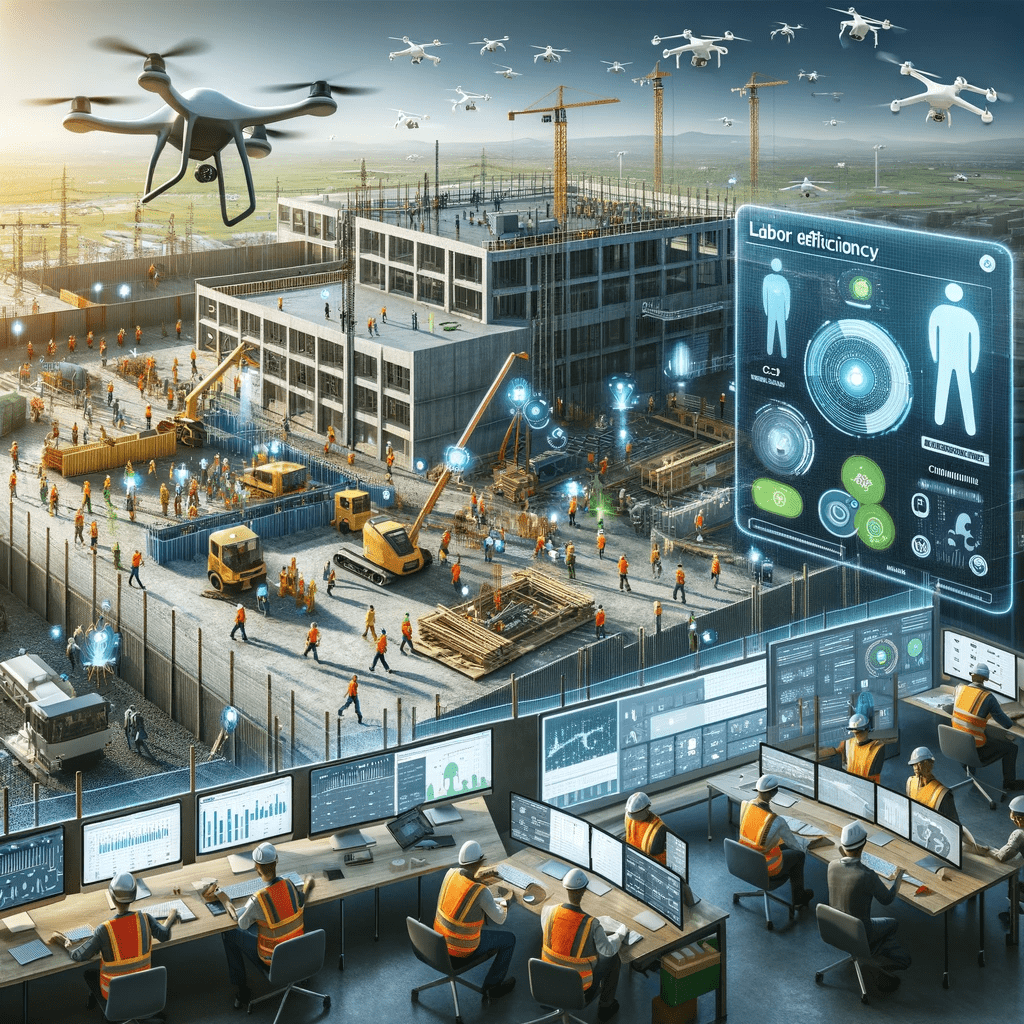
Measuring labor efficiency on construction sites is expensive, time-consuming, and requires labor. And ultimately, the results are not all that reliable.
For example, it is already challenging to track and measure the productivity of a single worker. But when multiple workers collaborate to complete a task, it becomes even more difficult to assess their productivity accurately.
As a result, construction managers often only assess labor efficiency when a noticeable problem arises. Unfortunately, this means that many opportunities for improving efficiency are overlooked entirely.
However, using AI-powered systems like computer vision, several cameras were installed to measure labor efficiency much easier.
Computer vision techniques like object detection and pose estimation can monitor worker activity. But it's not a straightforward task. Background clutter, obstructions, and workers wearing similar uniforms can make tracking workers challenging.
Due to this reason, researchers have proposed frameworks that use cameras and computer vision to track worker trajectories over time as a 4D data set. This data can then be converted into productivity measurements.
In studies, these frameworks determined time-on-task for single and multiple workers with a high degree of accuracy (84% to 95% accuracy). Though room for improvement remains.
Hence, computer vision shows promise for measuring labor efficiency better than human observation across an entire job site with multiple workers. The accuracy numbers indicate computer vision systems may be able to provide reliable productivity measurements in the future.
7. Land Survey and Mapping
We have already discussed how artificial intelligence (AI) can be used to keep track of and inspect people and objects on a construction site.
But what about surveying the actual site itself?
Having an accurate understanding of the land is extremely important for a construction project to be successful. This helps with planning before construction begins and ensures that the construction is progressing as intended.
To assist with this, companies like Datumate use AI-powered drones and cameras to conduct land surveys and create maps. One of their products, called DatuFly, is a good example of this.
DatuFly takes pictures of the land, construction sites, and infrastructure, and then uploads them to a secure server. Using computer vision and photogrammetry algorithms, the images are transformed into precise 2D and 3D maps and models with geographic references.
Historically, humans have been responsible for land surveying, and they have been quite proficient at it. However, the availability of modern technologies like drones and computer vision techniques has made the process much easier by reducing the time required and increasing accuracy.
The use of AI in construction planning is highly beneficial for project managers and workers because faster and more accurate mapping leads to more efficient construction processes.
Embracing the Future with Generative AI in Construction
In conclusion, the integration of Generative AI in the construction sector heralds a new era of innovation and efficiency. As we've explored in this article, this groundbreaking technology has the potential to revolutionize every facet of the construction process, from initial design to project execution. It offers unparalleled advantages in terms of precision, cost-effectiveness, and time management.
RedBlink Technologies stands at the forefront of this technological revolution. Our AI consulting services are specifically tailored to build a Generative AI solution construction industry By partnering with us, you can unlock numerous benefits:
- Innovative Design Solutions: Our AI algorithms can generate a multitude of design variations, enabling you to explore creative and efficient construction solutions that were previously unimaginable.
- Enhanced Efficiency and Precision: By automating and optimizing various construction processes, we help reduce errors, save time, and ensure superior quality outcomes.
- Cost Reduction: Our AI-driven approach significantly lowers the risk of costly mistakes and delays, ensuring that your projects stay within budget.
- Predictive Analysis and Risk Management: We employ advanced predictive models to foresee potential challenges and mitigate risks, safeguarding your projects against unforeseen obstacles.
- Sustainable and Green Solutions: Our AI tools are designed to promote sustainability, aiding in the creation of eco-friendly and energy-efficient structures.
- Customized AI Solutions: At RedBlink, we understand that every construction project is unique. Our team of experts collaborates closely with you to develop bespoke AI solutions that align perfectly with your specific needs and objectives.
In an industry as dynamic and competitive as construction, staying ahead of the curve is crucial. RedBlink’s AI consulting services not only equip you with the latest in AI technology but also provide the strategic insight to leverage this technology effectively. We ensure that your projects not only meet but exceed industry standards, setting new benchmarks in construction excellence.
Why Choose RedBlink for Your AI Journey?
As the construction industry continues to evolve, the adoption of Generative AI is not just an option but a necessity for staying relevant and competitive. RedBlink is your ideal partner in this journey, offering generative AI development services to transform your construction processes and outcomes.
- Expertise and Experience: Our team consists of seasoned professionals who are experts in both AI technology and the construction industry.
- Client-Centric Approach: We prioritize your needs and objectives, ensuring tailor-made solutions that deliver results.
- Cutting-Edge Technology: We stay abreast of the latest advancements in AI to provide you with state-of-the-art solutions.
- Comprehensive Support: From initial consultation to post-implementation, we offer unwavering support throughout your AI journey.
Embrace the future of construction with RedBlink. Let's build smarter, faster, and more efficiently with the power of AI. Contact us today to learn more about our AI consulting services and how we can help you revolutionize your construction projects.
AI in Supply Chain Management - Revolutionizing Logistics [2024]
In an era where the pace of technological innovation is uncompromising, the Industrial Internet of Things (IIoT) and Artificial Intelligence (AI) are redefining the frontiers of efficiency and customer-centricity in supply chain management.
Big Research Firms like Gartner, have predicted, that the integration of smart, interconnected tools within supply chains is not just a trend but a transformative shift, particularly vital for smaller companies operating on tighter budgets.
These organizations are now turning towards cloud-based technologies and Generative AI-powered software solutions like Chatbots and Virtual Assistants, Natural Language Processing, and Machine Learning, heralding a new era of smarter supply chain systems.
This transition is more than a mere upgrade; it's a strategic necessity. According to PwC, a globally recognized consultancy, AI is not just a tool but a game-changer, poised to contribute an astounding $15.7 trillion to the global economy by 2030. Its implementation is making supply chains more agile, efficient, and cost-effective, automating processes that were once manual and time-consuming.
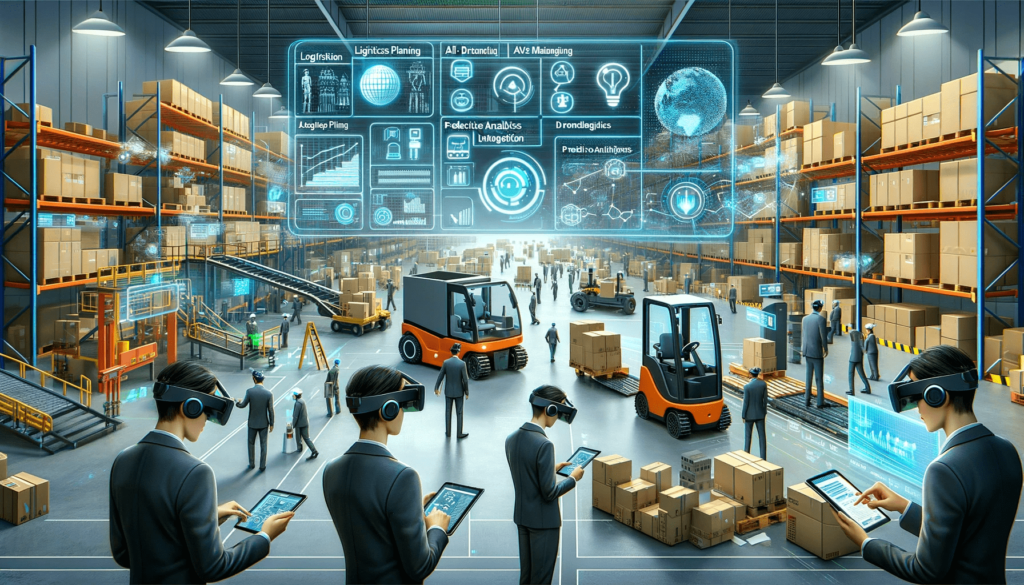
As we delve into the role of AI in supply chain management, we uncover not just its transformative impact but also its necessity. In a world where 47% of established organizations are actively integrating AI [source] and automation into their supply chains, standing on the sidelines is no longer an option.
Benefits of AI in the Supply Chain
Integrating AI into supply chain management has been a game-changer for many businesses. AI-driven solutions in warehouse logistics, quality checks, inventory, and supplier management have revolutionized these processes. They automate routine tasks, boost accuracy and efficiency, and support sustainable practices.
Here’s how a fully AI-optimized supply chain can benefit companies:
- Reduced Operating Costs: AI-driven SCM enables cost savings by cutting down purchasing and production expenses. Direct procurement, like a grocery store sourcing vegetables straight from the farmer, eliminates third-party costs and speeds up availability. AI also offers transparent data for enhanced supply chain visibility and cost efficiency.
- Increased Productivity and Lower Labor Costs: Manual task automation through AI improves efficiency and reduces the reliance on human labor, leading to significant cost savings.
- Strengthened Relationships in the Supply Chain: Effective relationship management ensures a balanced stock level, avoiding overstocking or shortages, and strengthens ties with suppliers, manufacturers, distributors, and retailers.
- Faster and Punctual Deliveries: AI’s capability to analyze data and identify patterns ensures the timely delivery of goods. For instance, Walmart utilizes AI to optimize inventory levels and expedite fresh food delivery, enhancing customer satisfaction [source].
- Optimized Transportation Networks: AI determines the most efficient transport routes, considering factors like truck capacity, fuel usage, and travel time. UPS, for example, uses AI for route optimization, improving package delivery efficiency.
- Mitigated Risks: AI tools can detect potential risks in warehouse management systems, allowing businesses to proactively address safety concerns and operational inefficiencies.
- Improved Decision-Making: While AI doesn’t replace human decision-makers, it enhances decision-making processes by analyzing vast amounts of data quickly and providing insightful, actionable intelligence.
Partnering with Generative AI development company like RedBlink Technologies can further elevate these benefits, offering tailored AI solutions that align with specific business needs and goals. This strategic collaboration not only streamlines supply chain management but also propels businesses towards innovation and sustainable growth.
Challenges of AI in Supply Chain Management
While AI in supply chain management offers tremendous benefits, several challenges stand in the way. These include complex system integration, talent acquisition and retention, ethical considerations, human-AI collaboration, and the need for continuous adaptation. Overcoming these obstacles requires a comprehensive approach that addresses each challenge holistically.
Building a Future-Proof AI Supply Chain:
The key to successfully navigating these challenges lies in investing in a robust AI strategy. This strategy should encompass:
- Talent Pipeline: Acquire a dedicated team of AI specialists, data engineers, and integration experts who can implement, maintain, and optimize AI solutions. You can partner with US based AI consulting firms to fill any skill gaps.
- Ethical Framework: Establish a clear AI ethics framework that promotes responsible data usage, mitigates bias, and ensures transparency in decision-making. Seek guidance from AI development companies to build trust and avoid potential reputational risks.
- Agile Adaptation: Foster a culture of continuous learning and innovation within your organization. Stay updated on the latest AI advancements and leverage ongoing training and development programs to equip your team to adapt to the rapidly evolving AI landscape.
- Human-AI Harmony: Bridge the gap between humans and AI by providing your workforce with upskilling opportunities to understand and collaborate effectively with AI systems. Promote a culture of trust and ensure human oversight for critical decision-making.
By strategically focusing on these core areas, businesses can transform the challenges of AI in supply chain management into opportunities for growth and optimization. Investing in the right talent, infrastructure, ethical framework, and continuous adaptation will unlock the transformative potential of AI, revolutionizing your supply chain and propelling your business into the future.
How to Implement AI in Your Supply Chain
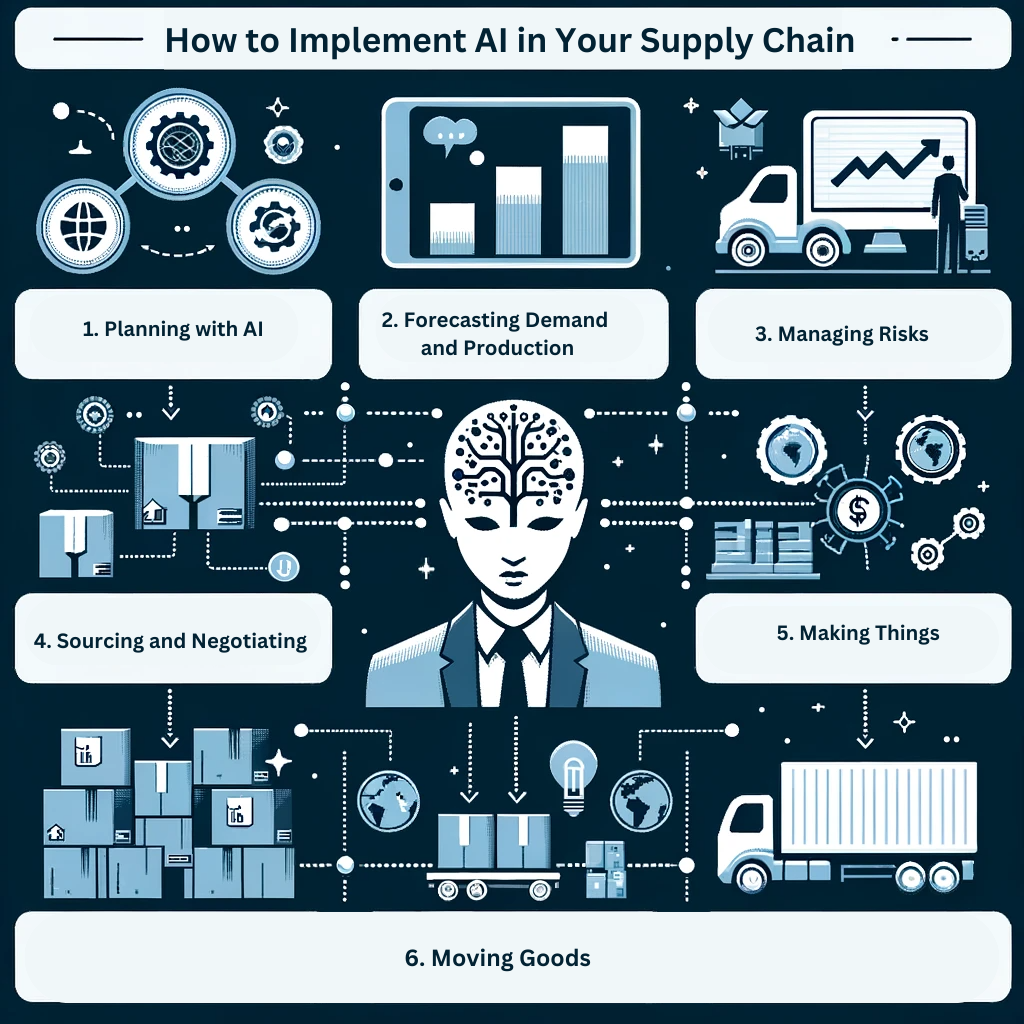
Implementing AI in your supply chain might sound complex, but it's really about using smart technology to make everything run smoother and more efficiently. Here's how you can do it in simple terms:
- Planning with AI: Think of AI as a super-smart helper that can make your planning process a breeze. Several AI planning tools are there to streamline planning by forecasting and managing risks. Such AI platforms anticipate the effects of global events on supply, offering alternative strategies and identifying hidden risks.
- Forecasting Demand and Production: There are various AI software that utilize machine learning to analyze past sales and market trends. This enhances inventory management and production planning, ensuring optimal stock levels and efficient production schedules.
- Managing Risks: Employ such AI solutions that act as intelligent risk detectors to assess various data points, including weather and geopolitical events, to foresee supply chain risks and provide preemptive strategies for mitigation.
- Sourcing and Negotiating: AI platforms also revolutionize sourcing and negotiations. Such AI tools assist in securing the best supplier deals, optimizing contract management, and improving decision-making, ultimately enhancing procurement excellence.
- Making Things: AI can speed up how quickly you go from designing something to making it. It helps find ways to make your production more efficient and can predict when machines might break down, saving you time and money.
- Moving Goods: Finally, there are various AI software that help in getting your products to where they need help. These AI tools can figure out the best routes for delivery, taking into account things like traffic and weather. This means faster deliveries and happier customers.
So, if you're looking to make your supply chain more efficient and smarter, getting the assistance of AI experts is an essential step. It can make a difference in every part of the process, from planning to delivering goods.
Why Supply Chain is a Natural Fit for AI?
The intricate and data-driven landscape of supply chain management naturally lends itself to the integration of generative AI and cognitive computing.
In response to this, Chief Operating Officers (COOs) and Chief Supply Chain Officers (CSCOs) are increasingly embracing the power of AI, particularly in generative AI development services to drive efficiency and innovation within their supply chains.
Hiring skilled AI professionals in supply chains can help build a tailor-made generative AI solution that significantly enhance various aspects of its operations. These services empower businesses to elevate material quality, streamline inventory management, and fortify risk mitigation strategies throughout the entire supply chain.
Machine learning, a fundamental component of generative AI, plays a pivotal role in accurately forecasting demand trends and optimizing product lifecycle management. This technology contributes to strategic planning by facilitating the navigation of fluctuating demand and supply constraints, providing decision-makers with invaluable data-driven insights.
Furthermore, the manufacturing sector is experiencing a transformative shift with the introduction of AI, particularly through generative AI development services.
Collaborative robots, equipped with advanced AI algorithms, operate seamlessly alongside human counterparts, boosting efficiency while ensuring safety. This innovative incorporation of AI into manufacturing processes underscores the immense potential of generative AI development services to revolutionize industry practices.
The synergy between the intricacies of supply chain management and the capabilities of AI, especially through the implementation of customized generative AI solutions underscores why AI is a natural fit for supply chains.
Supply chain companies that aim to optimize their processes and maintain a competitive edge in the market are increasingly turning to hiring artificial intelligence engineers. These professionals not only help you to enhance current operations but also strategically shape future business models, paving the way for enhanced efficiency and profitability.
Examples of AI in Supply Chain Management
Did you know that Vorto collaborates with key stakeholders in the supply chain to optimize operations and reduce carbon emissions through AI-driven platforms?
Early adopters of AI-enabled supply-chain management have improved logistics costs by 15%, inventory levels by 35%, and service levels by 65% compared with slower-moving competitors. Source
Well, not only this, Coupa also empowers supply chain companies to make data-driven decisions by analyzing logistics data, including variables such as tariffs and environmental events.
Apart from Vorto and Coupa, Epicor also leverages Microsoft Azure to enhance its business solutions, including supply chain management, using cloud-based AI solutions.
These examples highlight the transformative potential of AI in streamlining supply chain and logistics processes, ultimately leading to improved operations and sustainability efforts.
To get into more depth, check our post: Top 10 AI Consulting Companies for Small Businesses & Startups in 2024
Why is the Human Factor Still Important for AI?
Using AI technology is helpful, but we shouldn't forget the importance of people in the process. People bring things to the table that AI just can't match, like the ability to make ethical decisions, be creative, understand emotions, and take responsibility for actions.
Even though AI machines can do things quicker and with fewer mistakes, humans add a personal touch with their expertise, gut feelings, emotional understanding, and cultural insights. When we combine AI with human workers, we end up making smarter decisions and coming up with more innovative ideas for all sorts of jobs.
AI is here to make human skills even better, not to take their place. This is where AI development services come in – they're all about creating AI tools that complement our human strengths, making our work more efficient and effective.
Upgrading Your Supply Chain - How To Get Started?
Before diving into new technologies, assess your digital readiness with these three steps:
1) Set Realistic Expectations:
Before implementing AI, conduct a self-awareness test.
- Gather key stakeholders
- Ask important questions about targets and goals.
- Quantify short and long-term expectations against implementation costs, including technology expenses, temporary disruptions, and labor costs.
- Establish new KPIs related to high-level goals and understand how AI impacts specific operations.
Remember that AI benefits are cumulative; focus on long-term efficiency gains.
2) Evaluate Technology Usage:
- Assess your organization's readiness in terms of people, skills, and tools.
- Identify the need for specialized personnel, and training, and assess technology stack interoperability.
- Consider data collection, storage efficiency, open-source technologies, and the location of your tech stack.
This assessment involves both personnel and enterprise-wide planning.
3) Harness Your Data:
- Data is essential for AI; you likely have more data than you realize.
- Focus on consolidating existing data rather than collecting new data.
- Break down data silos, address cultural and process challenges, and encourage cross-team collaboration.
- Segregated business units before digital transformation to ease the process and assess readiness.
AI is transforming supply chain management. Whether you're just starting your digital transformation journey or ready to implement AI, these steps will guide your path forward.
For more information about the role of AI in supply chain management, or to get AI development services, feel free to contact the expert AI developers of RedBlink Technologies today! RedBlink is an AI consulting and generative AI development company, offering a range of services in the field of artificial intelligence. With their expertise in ChatGPT app development and machine learning development, they provide businesses with the ability to leverage advanced technologies for various applications. By hiring the skilled team of ChatGPT developers and machine learning engineers at RedBlink, businesses can unlock the potential of AI and enhance their operations with customized solutions tailored to their specific needs.
Top 10 AI Consulting Companies for Small Businesses & Startups in 2024
AI Consulting Companies for Small Businesses & Startups
The AI consulting landscape in 2024 is dominated by companies that not only offer cutting-edge solutions but also drive innovation in artificial intelligence. These top 10 AI consulting companies, based in the USA, are at the forefront of transforming businesses through AI technologies. They cater to a wide range of industries, offering services from generative AI consulting to AI consulting for small businesses and startups. Let's delve into each of these companies:
Key Takeaways
- In the year 2024, the foremost Artificial Intelligence consulting firms have emerged as key players in harnessing the power of AI. These organizations boast a team of seasoned experts equipped with profound insights and mastery over Generative and other advanced AI technologies.
- Collaborating with these top artificial intelligence consulting companies opens doors to accessing state-of-the-art and pioneering solutions, as they are dedicated to continually pushing the boundaries of technology.
- This article presents a thoughtfully curated compilation of some of the leading AI consulting companies in the industry.
Top 10 AI Consultants and Companies List in 2024
1. RedBlink Technologies - Pioneering Generative AI for Small Businesses
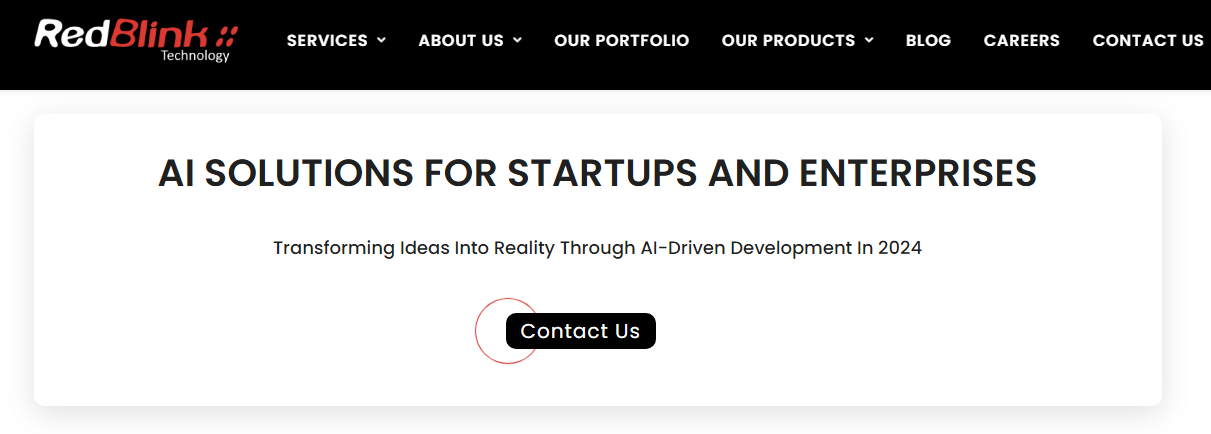
RedBlink Technologies stands as a distinguished AI consulting firm, recognized for delivering exceptional AI consulting services in the United States. As a leader among AI consulting companies, our specialization lies in building generative AI solutions, catering to businesses of varying scales, including small enterprises and startups.
With our profound expertise, we are well-positioned in the competitive landscape of artificial intelligence consulting firms, ready to empower your organization with cutting-edge AI solutions.
- Founded Year: 2008
- Team Size: 200+ employees
- LinkedIn Profile: https://www.linkedin.com/company/redblink-technologies/
- Industry Focus: Primarily focuses on technology, healthcare, and retail sectors, offering advanced AI solutions for business automation and data analytics.
2. Cambridge Consultants - Strategic AI Consulting
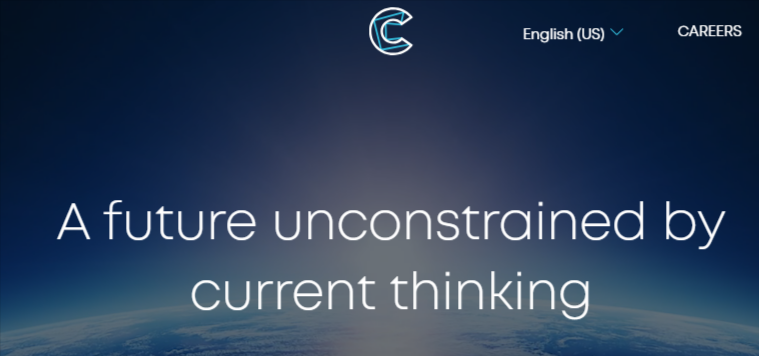
Cambridge Consultants, a distinguished leader in the field, has firmly established itself as one of the foremost AI consulting companies. Its expertise not only encompasses strategic and innovative consulting but also extends into the domain of transformative technology solutions.
- Team Size: 200+ employees
- LinkedIn Profile: https://www.linkedin.com/company/cambridge-consultants/
- Industry Focus: Cambridge Consultants offers services to diverse sectors such as automotive, energy, and consumer goods, focusing on leveraging AI for product innovation and market strategy.
3. ThirdEye Data - Big Data & AI Solutions
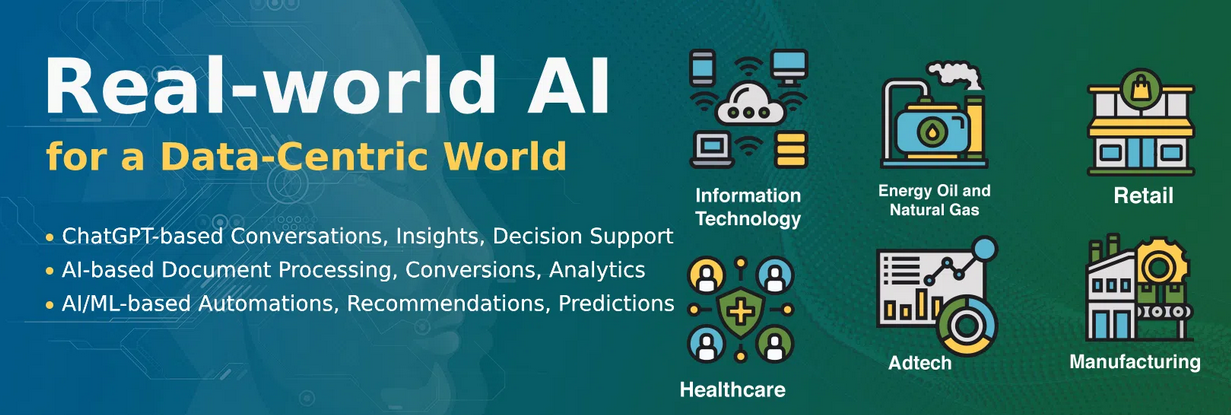
As a distinguished AI consultancy, ThirdEye Data harnesses the power of cutting-edge Artificial Intelligence (AI) and Big Data technologies to craft advanced AI applications tailored to meet the unique needs of enterprises across the globe. This innovative AI consulting company offers an extensive range of services encompassing robust data engineering and precise data science solutions.
- Team Size: 51-200 employees
- LinkedIn Profile: https://www.linkedin.com/company/thirdeyedata
- Industry Focus: Focuses on sectors like e-commerce, healthcare, and finance, providing AI solutions for data analytics, predictive modeling, and business intelligence.
4. Boston Consulting Group - AI Strategy & Digital Transformation

As a global consulting firm, BCG helps businesses harness technology, including AI, for transformative and sustainable growth. Its focus aligns seamlessly with the thriving AI consulting services market, where we excel in delivering innovative solutions that drive your business forward.
- Team Size: 10,001+ employees
- LinkedIn Profile: https://www.linkedin.com/company/boston-consulting-group
- Industry Focus: Works across multiple industries including energy, financial services, and consumer products, focusing on AI strategy, operational efficiency, and digital transformation.
5.Deeper Insights - Data Structuring & Prediction Algorithms

Deeper Insights is a partner in AI innovation with several years of experience in building AI solutions for large enterprises and scale-up clients. Their focus on advanced data structuring, prediction, and insights algorithms positions them as a leader in AI consulting, helping organizations make bolder decisions through deeper insights.
- Team Size: 11-50 employees
- LinkedIn Profile: https://uk.linkedin.com/company/deeperinsights
- Industry Focus: Deeper Insights serves a range of industries, including healthcare analytics, media monitoring, and financial AI
6. InData Labs - Revolutionizing AI in Advertising, FinTech
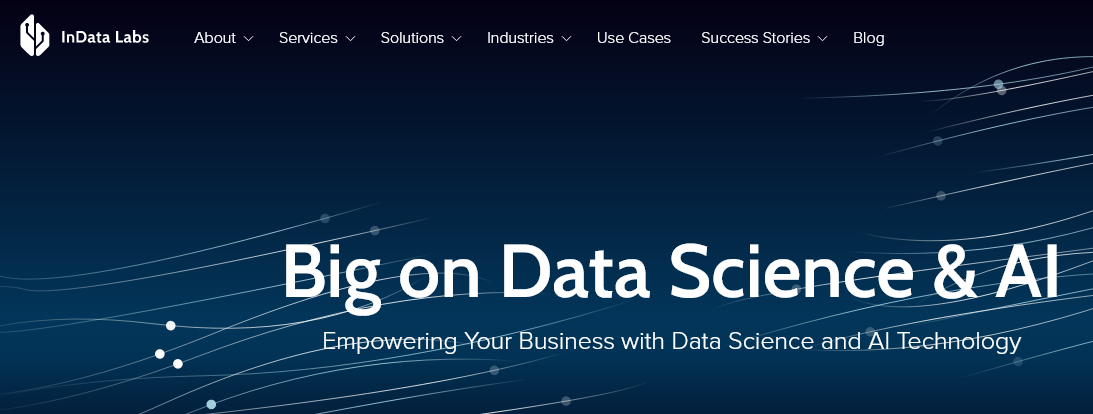
InData Labs exemplifies the dynamic and innovative nature of AI consulting firms, offering specialized services that cater to the evolving needs of businesses in various industries. Their expertise in AI consulting is essential for businesses seeking to leverage artificial intelligence for growth and efficiency.
- Team Size: 60 plus employees
- LinkedIn Profile: https://www.linkedin.com/company/indata-labs/
- Industry Focus: InData Labs provides AI solutions across various industries, including advertising, FinTech, retail & e-commerce, entertainment, and logistics & supply chain.
7. Azati - Software Innovation and Machine Learning
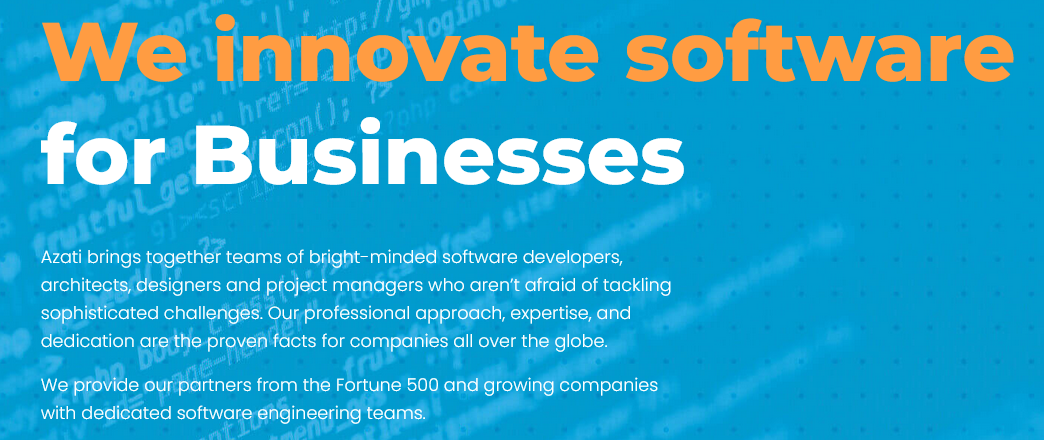
Azati stands out as an AI consulting firm that innovates software for businesses, bringing together a team of experts to deliver sophisticated solutions across various industries. Their focus on AI and machine learning, combined with their experience in diverse sectors, positions them as a versatile and capable partner for businesses looking to leverage AI technology.
- Team Size: 100 plus employees
- LinkedIn Profile: https://www.linkedin.com/company/azati-corporation/
- Industry Focus: Azati covers a range of industries, including insurance, bioinformatics, human resources, real estate, and medical insurance providers.
8. Bain & Company - Leads in Commercial Functions, Retail
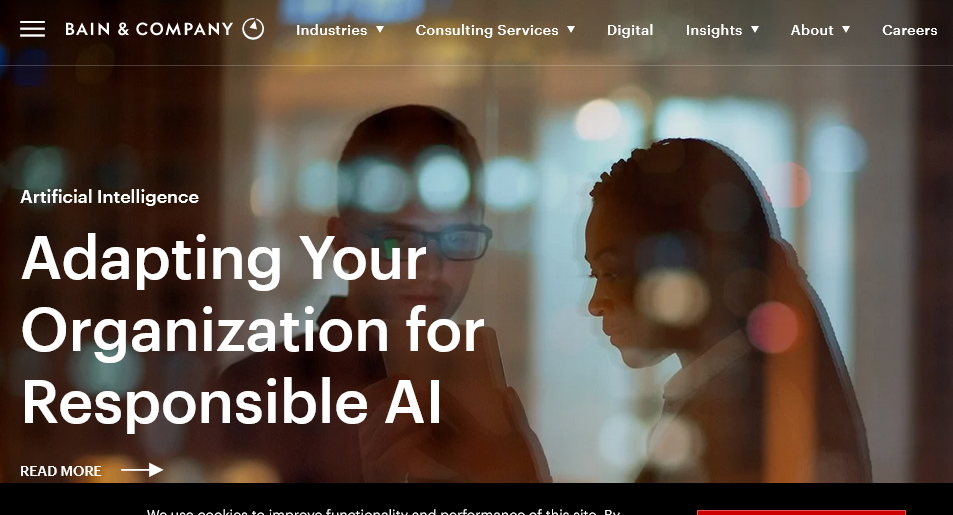
Bain & Company champions bold ideas to achieve extraordinary outcomes. As a leading global consultancy, they offer a range of services including AI consulting. Bain & Company helps businesses become faster, more flexible, and intensely customer-focused. They specialize in integrating generative AI into various aspects of business operations, enhancing commercial functions for top and bottom-line growth.
- Team Size: 500 plus employees
- LinkedIn Profile: https://www.linkedin.com/company/bain-and-company/
- Industry Focus: Bain & Company works across multiple industries, including retail, private equity, advanced manufacturing & services, technology, oil & gas, healthcare & life sciences, chemicals, consumer products, mining, and financial services.
9. Markovate - Revolutionizing AI Development
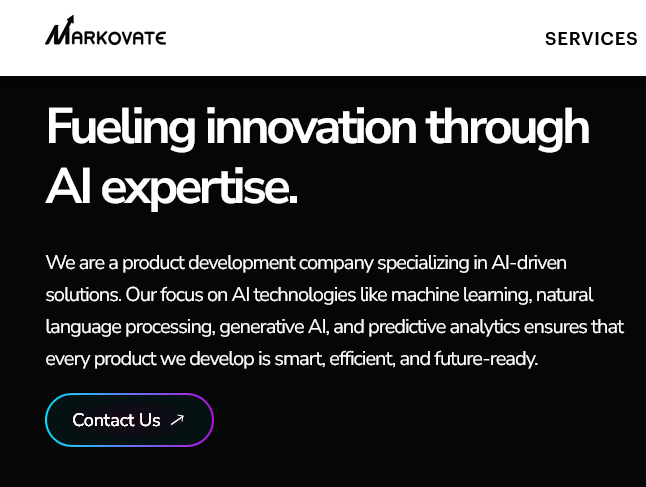
Markovate stands out as a highly creative and forward-thinking AI consulting firm. They offer specialized services in AI development that meet the changing needs of different types of businesses. Their knowledge in AI consulting is really valuable for companies that want to use artificial intelligence to grow and become more efficient.
- Team Size: Upto 50 employees
- LinkedIn Profile: https://www.linkedin.com/company/markovate/
- Industry Focus: Markovate serves a diverse range of industries, leveraging AI to enhance business operations and drive innovation. Their work spans across sectors such as fitness, retail, travel, SaaS, healthcare, and fintech, where they create world-class digital products, web design, and branding.
10. Addepto - Data Solutions Enhancing Customer Insights

Addepto stands out as an AI consulting firm that empowers businesses with innovative AI and data solutions, helping them harness the full potential of their data for smarter decision-making and operational efficiency. Addepto's expertise in AI consulting is evident in its ability to help businesses innovate with AI, enrich customer insights, automate processes, and be more cost-efficient.
- Team Size: 51 plus employees
- LinkedIn Profile: https://www.linkedin.com/company/addepto/
- Industry Focus: Addepto offers AI and data engineering solutions across various industries, including retail, finance & insurance, logistics, and manufacturing.
How to Select the Best AI Consulting Company in 2024
Choosing the right artificial intelligence consulting company involves several key steps. Here's a concise guide to help you make an informed decision:
- Define Your AI Needs: Identify whether you need broad AI consulting services or specialized ones like generative AI consulting.
- Expertise and Experience: Look for companies with a proven track record in your industry. Check their case studies and past projects for relevance.
- Technical Proficiency: Ensure the company has expertise in the latest AI technologies, especially if your needs are specific, like generative AI.
- Client Feedback: Check testimonials and reviews to gauge reliability and quality of service.
- Market Reputation: Research their standing in the AI consulting services market through awards, publications, and industry recognition.
- Customization and Flexibility: The company should offer solutions tailored to your unique business challenges.
- Cost-Effectiveness: Balance quality with affordability, is particularly important for startups and small businesses.
- Post-Implementation Support: Ensure they provide ongoing support after implementing AI solutions.
By focusing on these key aspects, you can narrow down the list of top AI consulting companies and select one that aligns best with your business needs and goals.
Hope this list helps you to find the generative AI development company for your AI projects. If you still have any questions, feel free to contact us. Choosing the right partner can make a significant difference in the success of your AI projects, ensuring innovation and growth for your business.
Top 10 Machine Learning Development Companies 2024
Machine Learning Development Companies
In the swiftly changing domain of technology, machine learning (ML) app development companies are at the forefront, offering innovative solutions that transform a range of industries. These companies, specializing in artificial intelligence (AI) and ML, equip businesses with the necessary tools and expertise to utilize data for strategic benefits.
As we step into 2024, the importance of machine learning development companies escalates, playing a pivotal role in advancing technology and improving business operations.
In this article, we have compiled a list of the top 10 ML app development firms in 2024, along with the criteria for selecting the best one. So without any further ado, let’s proceed.
Machine Learning Statistics for 2023
- Adoption Rate: Around 50% of businesses globally, including those in healthcare, manufacturing, and finance, have adopted machine learning, with a 42% global adoption rate growth since 2018.
- Market Size: The ML market is projected to reach $204.30 billion by 2024, with a notable increase in the employment of ML engineers.
These statistics underscore the burgeoning importance and widespread acceptance of machine learning in various business sectors. As we proceed, the focus will now shift to detailing the top machine learning app development organizations for 2024.
Key Takeaways
- In 2024, leading machine learning software development companies play a pivotal role in leveraging the capabilities of Machine Learning. These companies are staffed with highly experienced professionals who possess deep knowledge and expertise in machine learning technologies.
- Engaging with these ML development service providers offers an opportunity to tap into cutting-edge and innovative solutions, as they consistently strive to advance the frontiers of technology.
- This article offers a carefully selected list of some of the top machine learning development companies in the industry.
Tips to Choose a Machine Learning Consulting Company
Choosing the Right AI and ML Consulting Firm in 2024 should be based on:
- Proven Expertise and Experience:Opt for a firm with a solid history of success in machine learning, indicated by successful projects and extensive knowledge.
- Diversity of Services: Verify that the company’s services align with your specific needs.
- Customized Solutions: Choose a provider that offers solutions specifically tailored to your requirements.
- Client Feedback: Review testimonials from previous clients to gauge the enterprise's reliability and effectiveness.
- Up-to-date with Innovations: Ensure the ML company you choose keeps up with the latest developments in AI and ML.
Top Machine Learning Development Companies List [2024]
1. RedBlink Technologies - Generative AI Development Company

RedBlink Technologies is known for its expertise in machine learning development, leveraging advanced technologies like deep learning, natural language processing, and predictive analytics. Utilizing tools such as TensorFlow and PyTorch, they offer custom, scalable ML solutions across various sectors, with a strong commitment to ethical AI and data privacy. Our approach encompasses the full ML project lifecycle, ensuring state-of-the-art, efficient AI solutions. Hire Machine learning engineers on monthly or hourly basis.
Explore our company in detail here:
- Founded Year: 2008
- Location: 23 Railroad Avenue Unit 971 Danville, CA 94526
- Company Size: 50-249
- Linkedin Profile: https://www.linkedin.com/company/redblink-technologies/
2. Addepto - AI Solution Provider

Addepto is an AI Solution provider & Big Data Experts that develops custom AI Solutions. Its offerings include data science consulting, AI development, predictive modeling, NLP/text processing, data warehousing, reporting automation, and more.
Explore this company in detail here:
- Founded Year: 2017
- Location: 7077 Alvern St, Los Angeles, CA 90045, United States
- Company Size: 51-200
- Linkedin Profile: https://www.linkedin.com/company/addepto/
3. DataRobot AI Platform
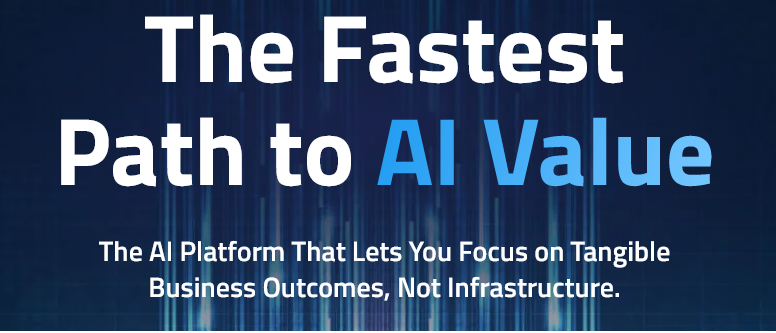
DataRobot leads in Value-Driven AI, making machine learning accessible through an automated modeling platform. It integrates top data science expertise, simplifying ML for broader use. DataRobot University further offers courses to enhance ML skills and apply this technology effectively in various organizations.
Explore this company in detail here:
- Founded Year: 2012
- Location: 225 Franklin St 13th floor, Boston, MA 02110, United States
- Company Size: 501-1000
- Linkedin Profile: https://www.linkedin.com/company/datarobot/
4. Databricks - The Data and AI Company
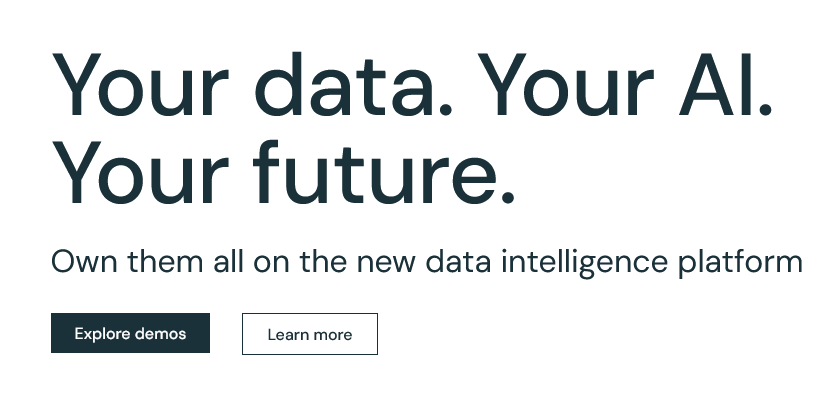
Databricks is another leading company in the USA specializing in machine learning (ML) development. It offers an innovative data intelligence platform that integrates generative AI, enhancing business operations through advanced ML technologies. Databricks specializes in developing generative AI applications, with a strong emphasis on machine learning development.
Explore this company in detail here:
- Founded Year: 2013
- Location: 160 Spear Street, 13th Floor, San Francisco, CA 94105, USA
- Company Size: 500+
- LinkedIn Profile: https://www.linkedin.com/company/databricks/
5. ScienceSoft - Software Development Company
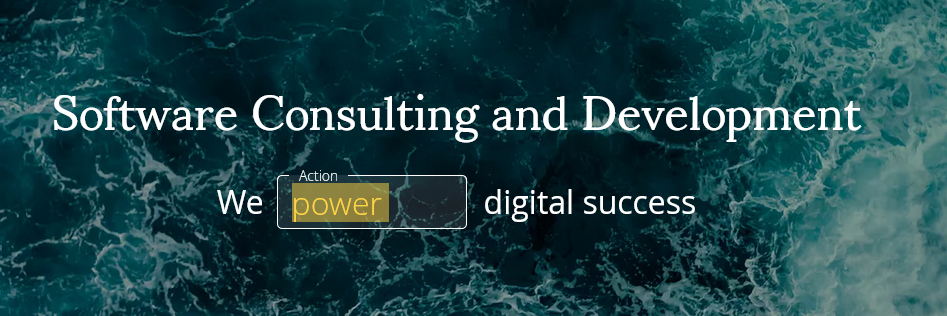
ScienceSoft is a leading data science and AI player, offering end-to-end machine learning services across various industries. Their expertise spans manufacturing, energy, retail, healthcare, and more, providing tailored solutions for supply chains, production efficiency, predictive maintenance, and more.
Explore this company in detail here:
- Founded Year: 1989
- Location: 5900 S Lake Forest Dr. Ste 300, McKinney, TX 75070, United States
- Company Size: 501-1000
- Linkedin Profile: https://www.linkedin.com/company/sciencesoft/
6. Innowise - Machine Learning

Innowise is a premier agency specializing in Machine Learning (ML) and Artificial Intelligence (AI) development. Their expertise encompasses the entire ML software development life cycle, encompassing critical phases such as project assessment, machine learning consultancy, strategic formulation, architectural design, seamless integration, and steadfast ongoing support.
Explore this company in detail here:
- Founded Year: 2007
- Location: 7901 4th St N, St. Petersburg, FL 33702, United States
- Company Size: 500+
- Linkedin Profile: https://www.linkedin.com/company/innowise-group/
7. RapidMiner - Data Science & Machine Learning
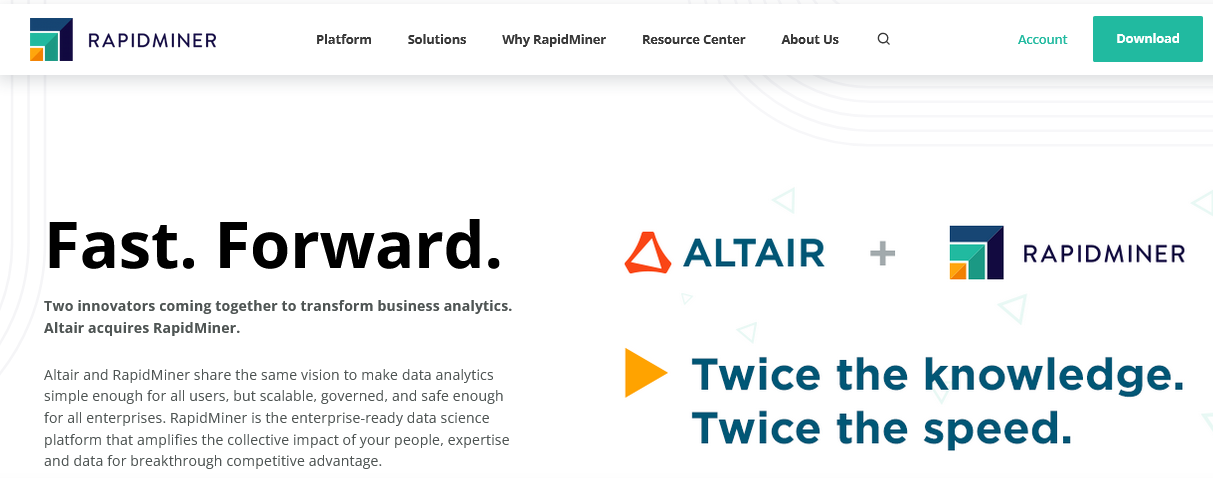
RapidMiner, a prominent player in data science and machine learning, offers a comprehensive platform that enhances the impact of people, expertise, and data in organizations. Their platform is designed to support teams across the full analytics lifecycle, including data engineering, model building, machine learning operations (ML Ops), AI application building, collaboration, governance, trust, and transparency.
Explore this company in detail here:
- Founded Year: 2005
- Location: One Boston Place, #2600, Boston, MA 02108, United States
- Company Size: 500+ employees
- Linkedin Profile: https://www.linkedin.com/company/rapidminer/
8. Symfa - Machine learning solutions
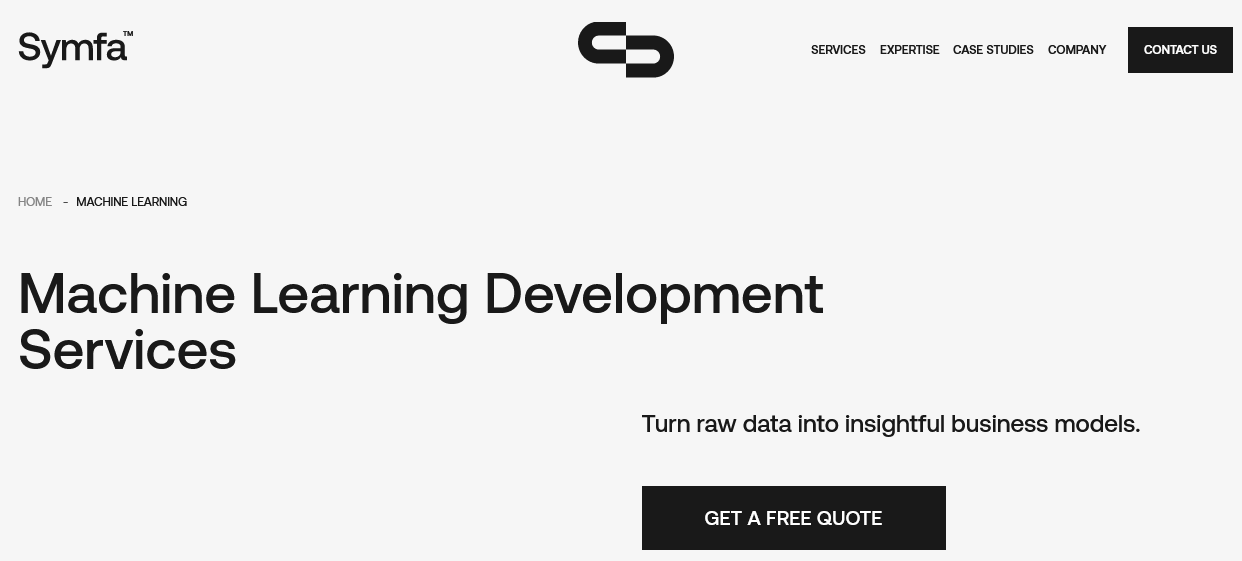
SYMFA offers specialized Machine Learning (ML) development services, focusing on transforming raw data into actionable business insights. Their key offerings include big data analysis, chatbots, conversational assistance, OCR and computer vision, AI-powered route planning, and speech recognition. These services are designed to enhance business efficiency and decision-making through intelligent automation and data processing.
Explore this company in detail here:
- Founded Year: 2008
- Location: 323 Sunny Isles Blvd Suite 714, Sunny Isles Beach, FL 33160
- Company Size: 200+ employees
- Linkedin Profile: https://www.linkedin.com/company/symfa-global
9. Markovate - Product & App Development Company
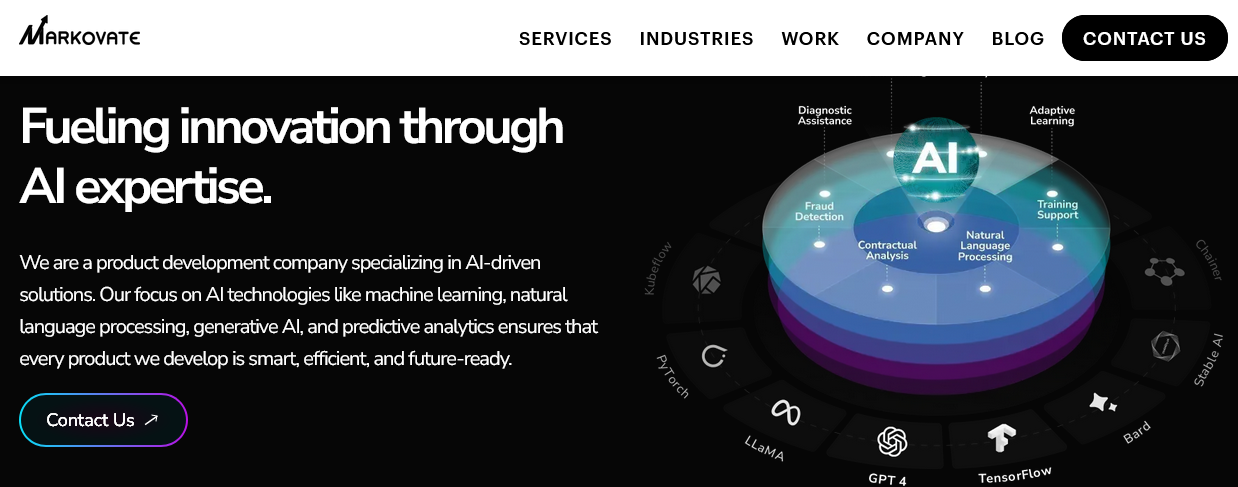
Markovate, a leading ML consulting firm, delivers advanced solutions for enhanced business outcomes. With a decade of experience, they excel in deep learning, predictive analytics, and personalized marketing automation across fintech, healthcare, and retail.
Explore this company in detail here:
- Founded Year: 2015
- Location: 388 Market St Suite 1300, San Francisco, CA 94111, United States
- Company Size: 11-50
- Linkedin Profile: https://www.linkedin.com/company/markovate/
10. Solu Lab
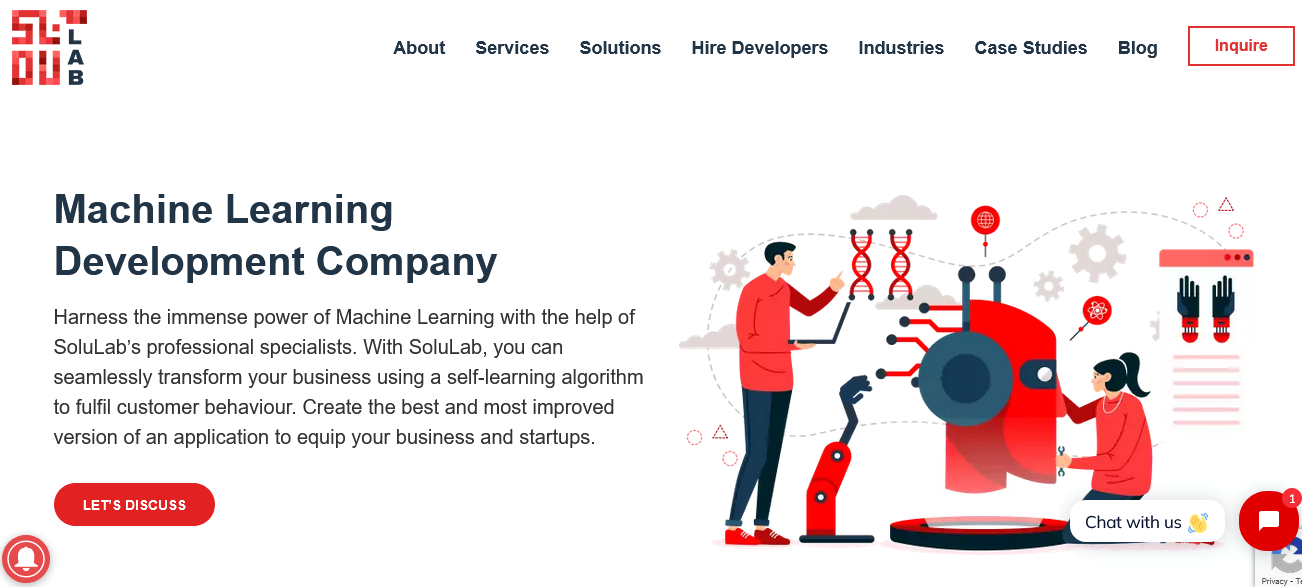
Last but not least, Solu Lab is in Artificial Intelligence (AI) and Machine Learning (ML) technology, offering world-class software development services. They specialize in agile business solutions using data science, machine learning, and artificial intelligence technologies.
Explore this company in detail here:
- Founded Year: 2014
- Location: 425 W 53rd St APT 208, New York, NY 10019, United States
- Company Size: 200 + employees
- Linkedin Profile: https://www.linkedin.com/company/solulab/
Selecting the right machine learning consulting company is vital for businesses aiming to leverage AI and data insights. These firms provide expertise, security, and tailored solutions. Whether enhancing customer experiences, automating operations, or gaining a competitive edge, a consulting partner can drive transformative results. Connect with our experts today to explore how machine learning can fuel your business success.
RedBlink is an AI consulting and generative AI development company, offering a range of services in the field of artificial intelligence. With their expertise in ChatGPT app development and machine learning development, they provide businesses with the ability to leverage advanced technologies for various applications. By hiring the skilled team of ChatGPT developers and machine learning engineers at RedBlink, businesses can unlock the potential of AI and enhance their operations with customized solutions tailored to their specific needs. Ready to dive more into generative AI? Learn how to build your own generative AI solutions.
FAQs - Machine Learning Consulting Firms
Q1 What Kind of Data is Needed for Machine Learning Projects?
Ans - The data required depends on the specific project. Generally, you need a substantial amount of relevant, high-quality data. The data should be well-structured and clean, although some firms also offer data cleaning and preparation services.
Q2 How Much Does Machine Learning Consulting Cost?
Ans - The cost varies widely depending on the project's complexity, duration, and the firm's expertise. Some firms charge hourly rates, while others may offer fixed pricing for complete projects. It's important to discuss and understand the pricing structure before starting a project.
Q3 How Long Does a Machine Learning Project Take?
Ans - The timeline can range from a few weeks to several months, depending on the project's scope and complexity. Initial consultations, data preparation, model development, and deployment all contribute to the project duration.
Q4 Can Machine Learning Consulting Firms Work with My Existing Data Team?
Ans - Yes, most firms are willing to collaborate with your existing data team. This collaboration can enhance the skills of your in-house team and ensure the solutions are well-integrated into your business processes.
Q5 What Industries Do Machine Learning Consulting Firms Serve?
Ans - Machine learning consulting firms serve a wide range of industries, including finance, healthcare, retail, manufacturing, technology, and more. They tailor their services to meet the unique challenges and opportunities of each industry.
Q6 How Do I Measure the Success of a Machine Learning Project?
Ans - Success can be measured by the project's impact on business goals, such as increased efficiency, reduced costs, improved customer satisfaction, or revenue growth. The accuracy and performance of the machine learning models are also key indicators.
Q7 What Happens After the Project is Completed?
Ans - After project completion, firms usually provide support and maintenance services. This might include monitoring the model's performance, making adjustments as needed, and providing training to your team.
Q8 Are There Any Risks Involved in Machine Learning Projects?
Ans - Risks include data privacy concerns, potential biases in the model, and the possibility of inaccurate predictions. A reputable firm will discuss these risks and their mitigation strategies upfront.
Top 10 Artificial Intelligence (AI) Development Companies in 2024
“Did you know that in 2023, over a quarter of all investment in American startups was directed towards companies specializing in artificial intelligence (AI)? - Source”
The year 2024 marks a watershed moment for Artificial Intelligence (AI) integration across diverse industries. AI development companies are at the forefront of this revolution, crafting groundbreaking solutions that transform customer experiences, optimize operations, and drive innovation.
This article explores the burgeoning landscape of AI development, highlighting key criteria for selecting the right partner for your AI ambitions.
But, before that let’s have a look at the criteria for choosing the top Artificial Intelligence development firm.
Key Takeaways
- In 2024, top-tier AI development companies will be at the forefront of harnessing the power of Artificial Intelligence. These specialized organizations boast a team of seasoned professionals with profound expertise in the field.
- By collaborating with these AI development firms, you gain access to the latest and most innovative solutions, as they are continuously pushing the boundaries of technological advancement.
- Within this article, we present a curated list of some of the industry's leading AI development companies and the criteria for selecting the best AI development company to convert your AI dream into reality.
Criteria for Selecting Top Artificial Intelligence (AI) Companies
Selecting the right AI development company is an important decision that can significantly impact the success of your AI initiatives. When evaluating potential partners, several key factors should be considered:
- Market Experience: Assess the duration of the company's presence in the AI market. Long-standing companies often have a deeper understanding of evolving AI trends.
- Client Testimonials: The next factor is client feedback. Customer reviews provide valuable insights into the company's ability to deliver effective solutions and maintain customer satisfaction.
- Product Quality: Examine the quality of products developed by the company. High-quality AI solutions are indicative of the company's technical expertise.
- Team Size: A larger team may offer a broader range of skills and capabilities, essential for complex AI projects.
- Industry Diversity: Companies with experience across various industries can offer more versatile and adaptable AI solutions.
- Flexibility: The ability to adapt to changing project requirements and new technologies is crucial for successful AI development.
- Cost Efficiency: Evaluate the service cost to the value delivered. Cost-effectiveness is key, especially for long-term collaborations.
- AI Product Portfolio: The number and variety of AI products delivered reflect the company's expertise and innovation capabilities.
- Understanding of Business and Market: A deep understanding of business and market trends ensures that the AI solutions are aligned with your business goals.
- Tech Stack: Knowledge of the latest technologies and tools is essential for developing cutting-edge AI solutions.
Top Artificial Intelligence (AI) Companies 2024
We have carefully examined various factors to compile a list of leading AI software development enterprises except for Google, Microsoft, IBM, and Open AI as these tech giants are industry leaders. However, the AI companies enlisted below exhibit profound expertise in their field. They possess an unwavering thirst for innovation. Each one demonstrates a steadfast dedication to delivering transformative AI solutions.
1. RedBlink Technologies - Generative AI Development Company
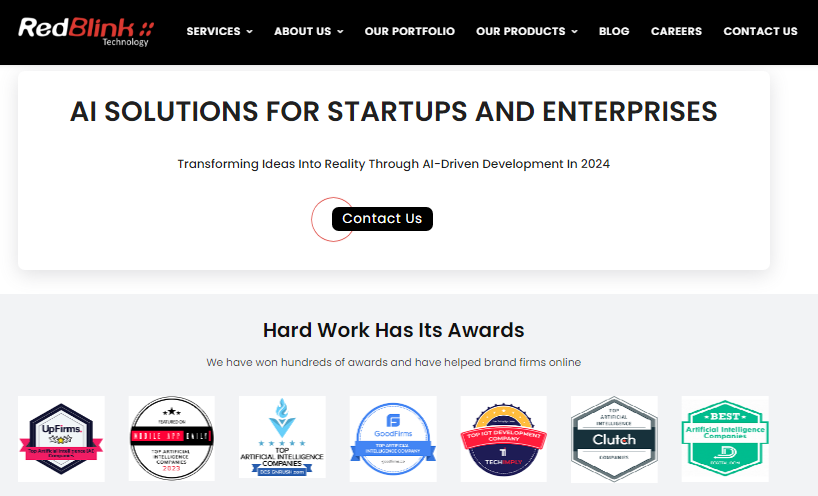
The first AI development company on the list is RedBlink Technologies, which stands at the forefront of AI development. Our expertise extends to sophisticated AI domains including machine learning, cloud computing, and AI-powered Mobile App Development and Web Application Development Services. We excel in integrating generative AI to create smarter, and build generative AI solution that revolutionize how businesses operate.
Core AI Expertise:
- Machine Learning Development
- AI-Powered Mobile App Development
- Web App Development with AI
- Cloud Computing and AI
- AI for Business Analytics
- Natural Language Processing (NLP)
- Computer Vision
- Predictive Analytics
- Chatbot Development
- AI-Driven Automation
- AI in IoT Applications
- Custom AI Solution Development
Founded Year: Founded in 2007/2008
Location: 23 Railroad Avenue Unit 971Danville, CA 94526
Team of AI Innovators: 50-249 professionals
Showcase of AI Mastery: https://redblink.com/our-portfolio/
2. Yellow - Enterprise GPT for autonomous CX & EX
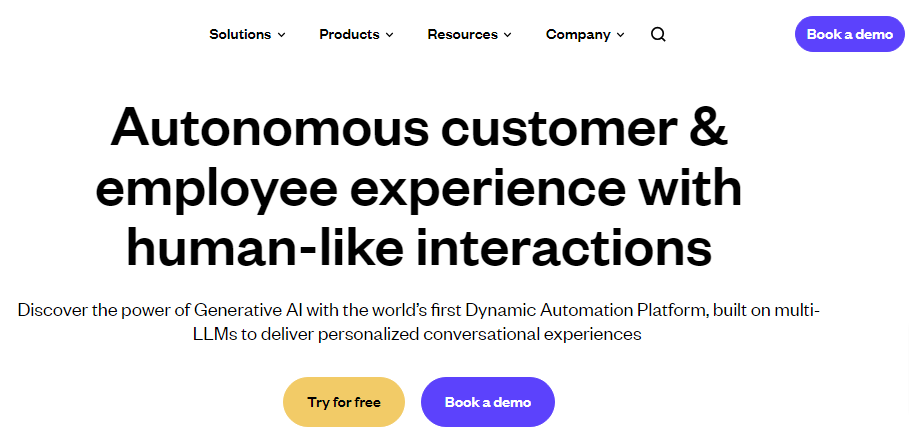
Yellow is the next leading AI development company in 2024, which excels in delivering business-focused software solutions through daily client collaboration, ensuring transparent and scalable AI-based products from concept to post-launch.
Core AI Expertise:
- Artificial Intelligence
- Machine Learning
- Data Science
- Chatbot Development, and
- UX/UI Design.
Founded Year: Founded in 2016
Location: 400 Concar Drive, San Mateo, CA 94402
Team of AI Innovators: 900+
3. AE Studio - Custom Software Development
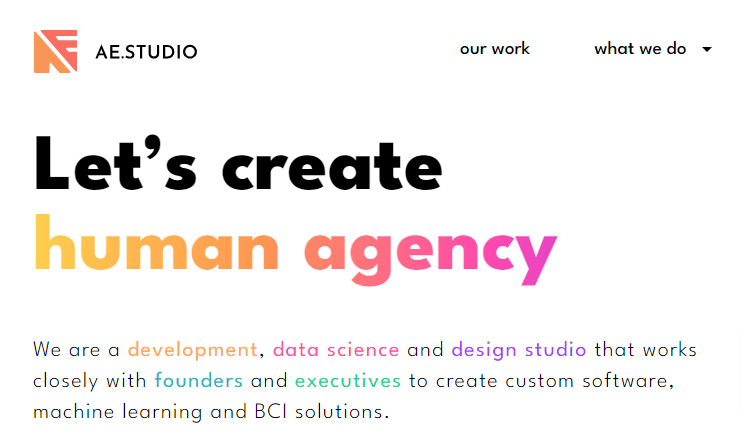
The next on the list is AE Studio. It is a dynamic Artificial Intelligence development company known for its deep expertise in AI and software creation. They specialize in blending AI technologies with human-centric design to create solutions that not only drive business efficiency but also enhance user experiences.
Core AI Expertise:
- Advanced Machine Learning
- Data Science and Analytics
- AI-Driven Software Development
- AI in Design and User Experience
- Predictive Analytics
- AI-Powered Business Solutions
Founded Year: Founded in 2016
Location: 1434 Abbot Kinney Blvd, Venice, CA 90291
Development team: Brazil
Team of AI Innovators: 150+
Portfolio: https://ae.studio/work
4. ThirdEye Data - AI Services & Solutions Provider
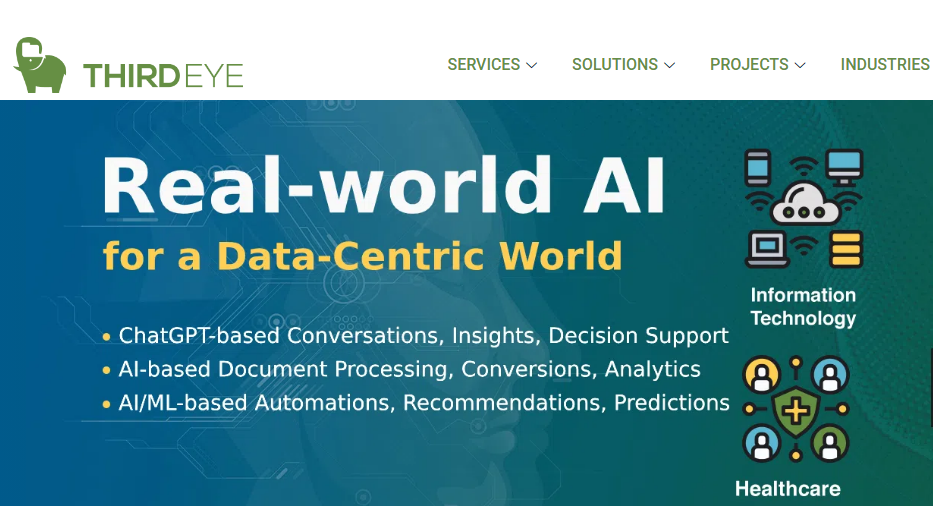
ThirdEyeData stands as a prominent player in the field of AI and data science. Based in Silicon Valley, they offer comprehensive services in data sciences, analytics, and engineering. With a decade of experience, they cater to a diverse client base, ranging from Fortune 500 companies to innovative startups.
Core AI Expertise:
- Data Science
- Machine Learning And AI Consulting
- AI Application Development
- Data Engineering
Founded Year: Founded in 2010
Location: 333 West San Carlos Street, San Jose, CA 95110 USA
Team of AI Innovators: The company boasts a team size of 50-99
Showcase of AI Mastery: https://thirdeyedata.ai/case-studies/
5. Addon Solutions - Top Mobile App Development Company
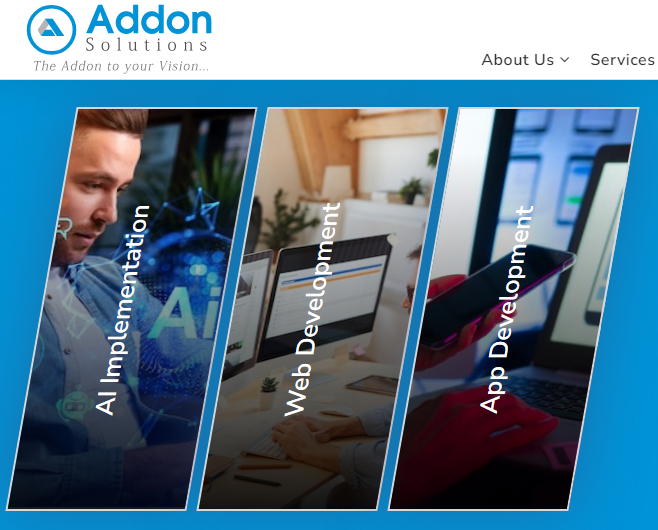
Moving further, Addon Solutions is recognized for its expertise in AI and mobile app development. They offer a range of services from AI-driven decision-making tools to comprehensive mobile and web app development.
Core AI Expertise:
- Artificial Intelligence for Decision Making
- Mobile App Development (Android, iPad, iPhone)
Founded Year: Founded in 2008
Location: Hung Du Luong, 5115 Creditview Road, Mississauga, Ontario, L5V 1R8, Canada
Team of AI Innovators: 51 to 200 Employees
Showcase of AI Mastery: https://addonsolutions.com/our-work.html
6. Hugging Face- The AI community building the future
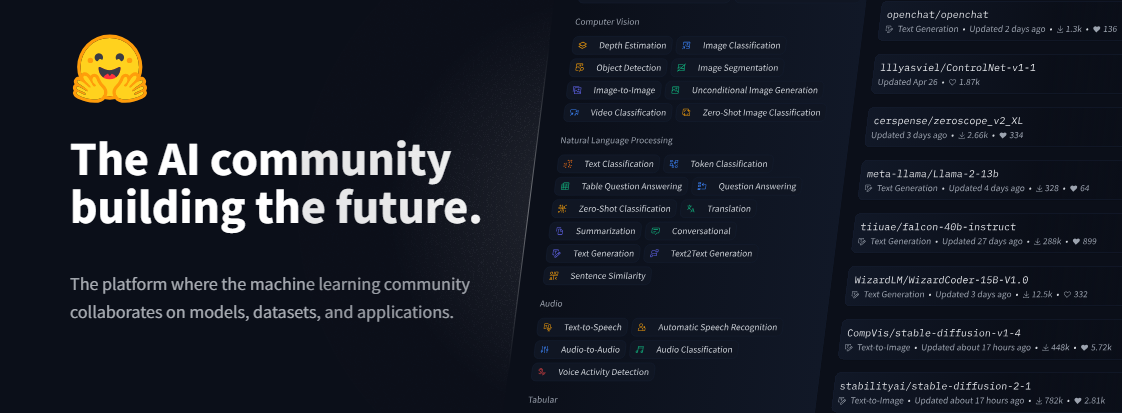
In 2023, Hugging Face excelled in hosting AI models like Llama 2, collaborating with Dell and AWS, and launching its models. It remains a hub for open-source AI repositories.
Core AI Expertise:
- Natural Language Processing (NLP)
- Language Models
- Ethical AI
- Transformer-Based Model
- Language Generation
Founded Year: Founded in 2016.
Location: 20 Jay St Suite 620, Brooklyn, NY 11201, United States
Team of AI Innovators: 200+ Professionals
7. Inventcolabs - Software Development Services
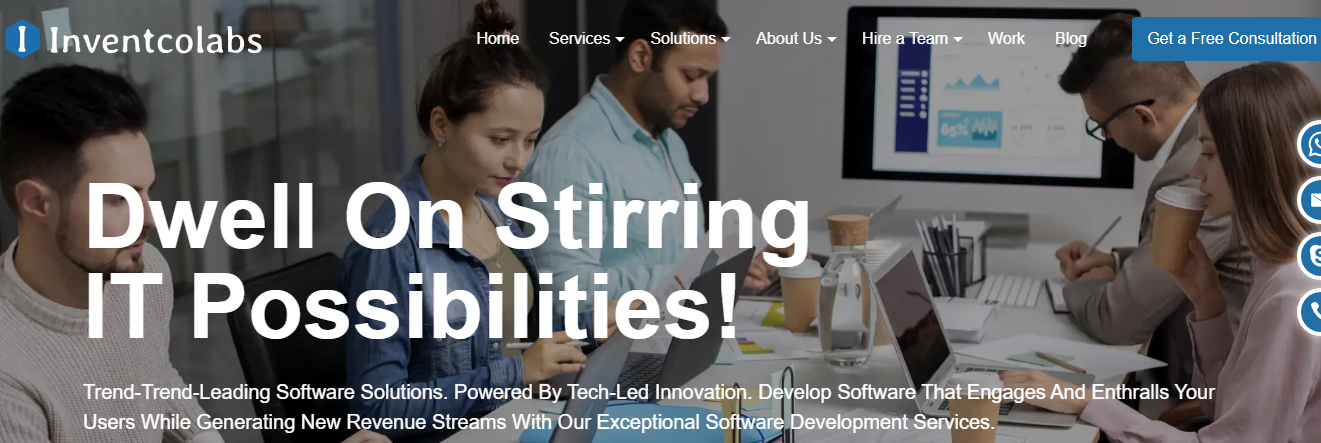
Inventcolabs is recognized as a promising AI software development company, known for its wide array of Artificial Intelligence app development services. They are adept at solving business-centric problems with robust applications and offer comprehensive solutions across various functional domains and service verticals.
Core AI Expertise:
- AI and Business Intelligence
- Natural Language Processing (NLP)
- AI-Assisted Chatbot Development
- AI Solutions for E-commerc
- Robotic Process Automation (RPA)
- Machine Learning
Founded Year: Inventcolabs was founded in 2013,
Location: 70 Saratoga Ct, Somerset, NJ 08873
Team of AI Innovators: 50-249 professionals
Showcase of AI Mastery: https://www.inventcolabssoftware.com/portfolio
8. App Studio - App Development Services
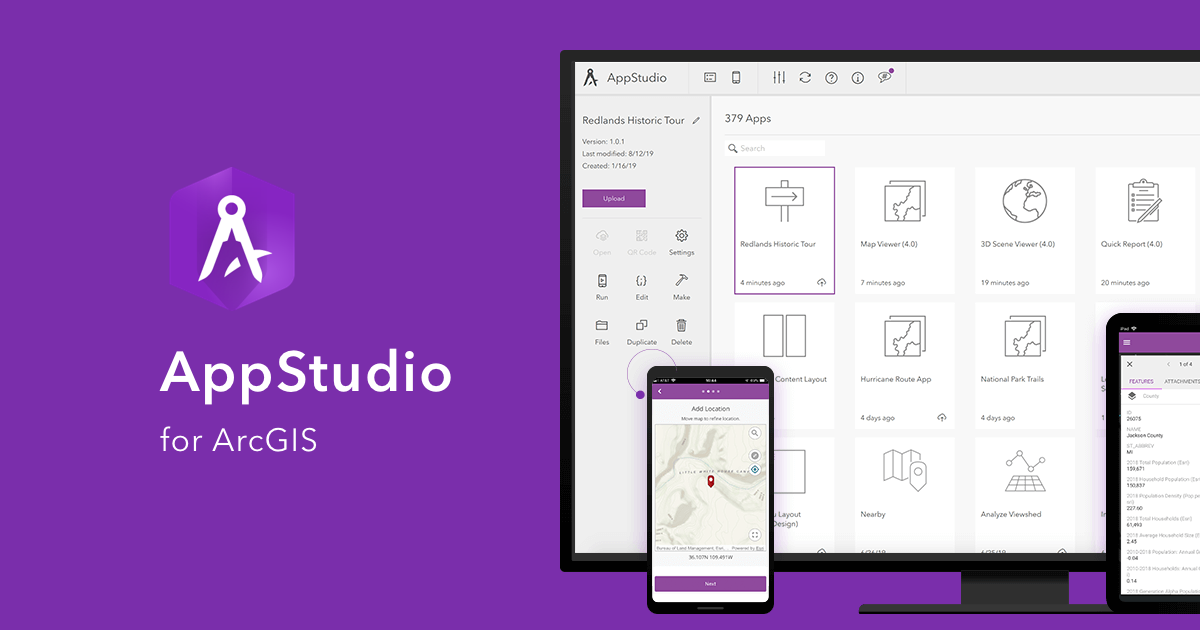
App Studio has established itself as an exclusive company in AI app development, harnessing the innovative, transformative, and disruptive potential of Artificial Intelligence. Their services significantly enhance business functions, performance, and workflow processes across various industries.
Core AI Expertise:
- Machine Learning
- Natural Language Processing (NLP)
- Image Processing and Computer Vision
Founded Year: 2009
Location: 800 Boylston Street, 16th Floor, Boston, MA 02199, United States
Team of AI Innovators: 11-50 employees
Showcase of AI Mastery: https://www.appstudio.ca/work.html
9. Interexy - Custom Web & Mobile App Development
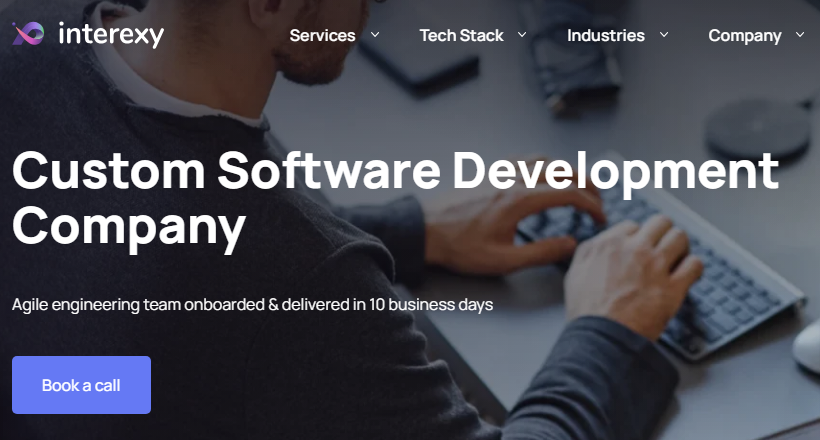
Interexy has emerged as a notable entity in the AI development sector, specializing in mobile app development services for iOS and Android, as well as creating custom software solutions. They are adept in various AI technologies, including VR and blockchain, and have developed solutions for the mHealth sector.
Core AI Expertise:
- AI and ML in Mobile App Development
- VR and Blockchain Integration
- mHealth Solutions
Founded Year: 2017
Location: 275 Commercial Blvd STE 301, Lauderdale-By-The-Sea, FL 33308
Team of AI Innovators: 51-200 professionals
Showcase of AI Mastery: https://interexy.com/portfolio/
10. Micro1 - World-class software engineers, powered by AI
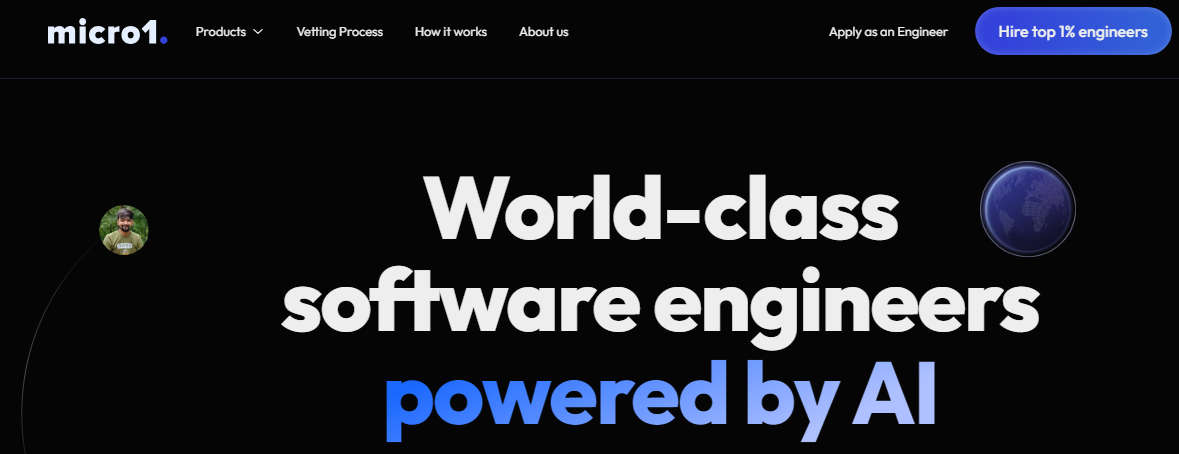
Micro1 is distinguished for its expertise in AI-driven software engineering. They focus on providing world-class software engineering services, powered by AI, and have developed a technical vetting tool that utilizes AI.
Core AI Expertise:
- AI-Powered Software Engineering
- AI Technical Vetting Tool
Founded Year: Founded in 2022.
Location: Greater Los Angeles Area, West Coast, Western US.
Team of AI Innovators: 1 to 50 employees.
The landscape of AI development companies in 2024 is diverse and dynamic, reflecting the rapid advancements and expanding applications of artificial intelligence across various sectors. Each of the top 10 AI development companies listed here showcases a unique blend of expertise, innovation, and technological prowess, catering to a wide range of industries and needs.
From RedBlink Technologies' comprehensive approach in machine learning and AI-powered app development to Micro1's focus on AI-driven software engineering and technical vetting tools, these companies are not just shaping the current state of AI but are also laying the groundwork for future innovations.
Whether it's through enhancing business analytics, integrating AI in IoT applications, or pushing the boundaries in fields like NLP and computer vision, these organizations are at the cutting edge of AI development.
RedBlink is an AI consulting and generative AI development company, offering a range of services in the field of artificial intelligence. With their expertise in ChatGPT app development and machine learning development, they provide businesses with the ability to leverage advanced technologies for various applications. By hiring the skilled team of ChatGPT developers and machine learning engineers at RedBlink, businesses can unlock the potential of AI and enhance their operations with customized solutions tailored to their specific needs.
FAQs to Choose The Best AI Development Company
Q1 Key Factors in Choosing an AI Development Company in the USA?
Ans. Consider the company's expertise, experience, work portfolio, pricing, customer reviews, and understanding of your business needs to deliver customized solutions.
Q2 Services Top AI Development Companies Offer?
Ans. These companies provide a range of services like chatbot development, machine learning, natural language processing, computer vision, and data analytics. Some specialize in sectors like healthcare or finance, while others have a more general service portfolio.
Q3 Cost and Development Timeframe We Expect for Our AI Project?
Ans. AI development costs vary based on project complexity and company pricing structures. Timelines also differ depending on the project scope, but companies generally provide estimates during initial consultations.
Q4 Benefits of Artificial Intelligence Software Development for Businesses?
Ans. AI services automate processes, enhance customer experiences, provide valuable data insights, and increase efficiency, aiding businesses in making better decisions and staying competitive in the digital landscape.
Q5 Why Scalable AI Teams Are Important?
Scalability in AI development teams is essential for adapting to evolving project needs and future growth, ensuring the availability of additional AI engineers as required.

